No. 2
February 2023
Memorial Marches for Missing and Murdered Indigenous Women and Girls
• End Colonial Justice! Uphold the Rights of All!
• Trudeau Government's Shameless Refusal to Fulfill Requirements of Calls for Justice
First Ministers' Meeting on Health Care
• Forms of
Deception in the Name of
Fixing Health Care System
• Essence of the Anti-Social Offensive
• Ontario Government's Reduction of Medical Wait Times by Financing Private Clinics
• Actions in Ontario in Defence of Public Health Care
• Upcoming
Actions to Support Ontario Nurses
as Negotiations Begin
More Attempts to Divest Governments of Constitutional and Legal Limitations
• Fast-Tracking Approval of Mining Projects
• Quebec Mining Act Grants Private Interests Unfettered Rights
• Organization
Demands Integrated Planning and Development
of Mined Land in Quebec
• Medieval Conception of "Free Mining"
• Northern
Ontario First Nations Form Alliance
to Oppose Free Mining
Indigenous Peoples Affirm Their Sovereignty, Hereditary and Treaty Rights
• Canada's Treachery on Rights of Indigenous Peoples
• Wet'suwet'en Steadfastly Demand Canada Uphold Hereditary Rights and Constitutional Obligations
• Haudenosaunee Land Defenders Affirm Right to Be
Finding Solutions for Problems Faced by Asylum Seekers
• Montreal
Community Organizations Demand Dignity and
Rights for Asylum Seekers
• Community
Organizer Elaborates Problems
Facing Asylum Seekers
• Tribute to Victim of Canada's "Rules-Based Order"
• Spirited Hamilton Rally Demands Status for All Without Exception
Matters of Concern Around the World
• No to Canada's
Interference in Peru! Support the Peruvian
People's Just Demands!
• Shame on Canada for Deploying Spy Planes to Haiti
• Unions Join
Forces to Support Haitian-Led Solutions
to Crisis in Haiti
• Earthquake Death Toll in Turkey and Syria Exceeds 33,000
• Palestinian Political Prisoners Launch Mass Hunger Strike
• U.S. War Against Africa Intensifies
Memorial Marches for Missing and Murdered Indigenous Women and Girls
End Colonial Justice! Uphold the Rights of All!
|
|
On February 14, marches are organized across Canada by the friends and families of missing and murdered Indigenous women and girls, with participation from people who stand with Indigenous Peoples in asserting their right to be. These marches honour the lives of those murdered or missing and demand justice and an end to state-organized violence against Indigenous Peoples.
This is the 32nd year that these marches have taken place. The first, in Vancouver in 1992, paid tribute to a woman murdered in the Downtown Eastside neighbourhood and demanded justice. Between the first Memorial March and the one in 2019 more than 970 names had been added to the list of women who have gone missing or been murdered in this neighbourhood alone.
As women prepare for this year's memorial march, top of mind are the four Indigenous women brutally murdered in Winnipeg in 2022, whose remains were discarded in garbage dumps, and the fight of their families for justice and dignity for their loved ones. They were among ten Indigenous women murdered in that city last year.
From November 2015 -- when the Trudeau government came to power with its promises to end the violence and establish a new relationship with Indigenous Peoples -- to the end of 2021, at least 227 Indigenous women and girls have been murdered. The number of those missing and murdered is a damning indictment of the government's refusal to act.
These killings and disappearances take place under conditions of racist violence and genocidal infringements on treaty and hereditary rights under the guise of lofty ideals. Genocidal aims have imbued the official colonial policy towards Indigenous Peoples since the creation of Canada, in which Indigenous women in particular are considered easy prey. These crimes must end and Canada must redress them and uphold nation-to-nation relations with the Indigenous Peoples.
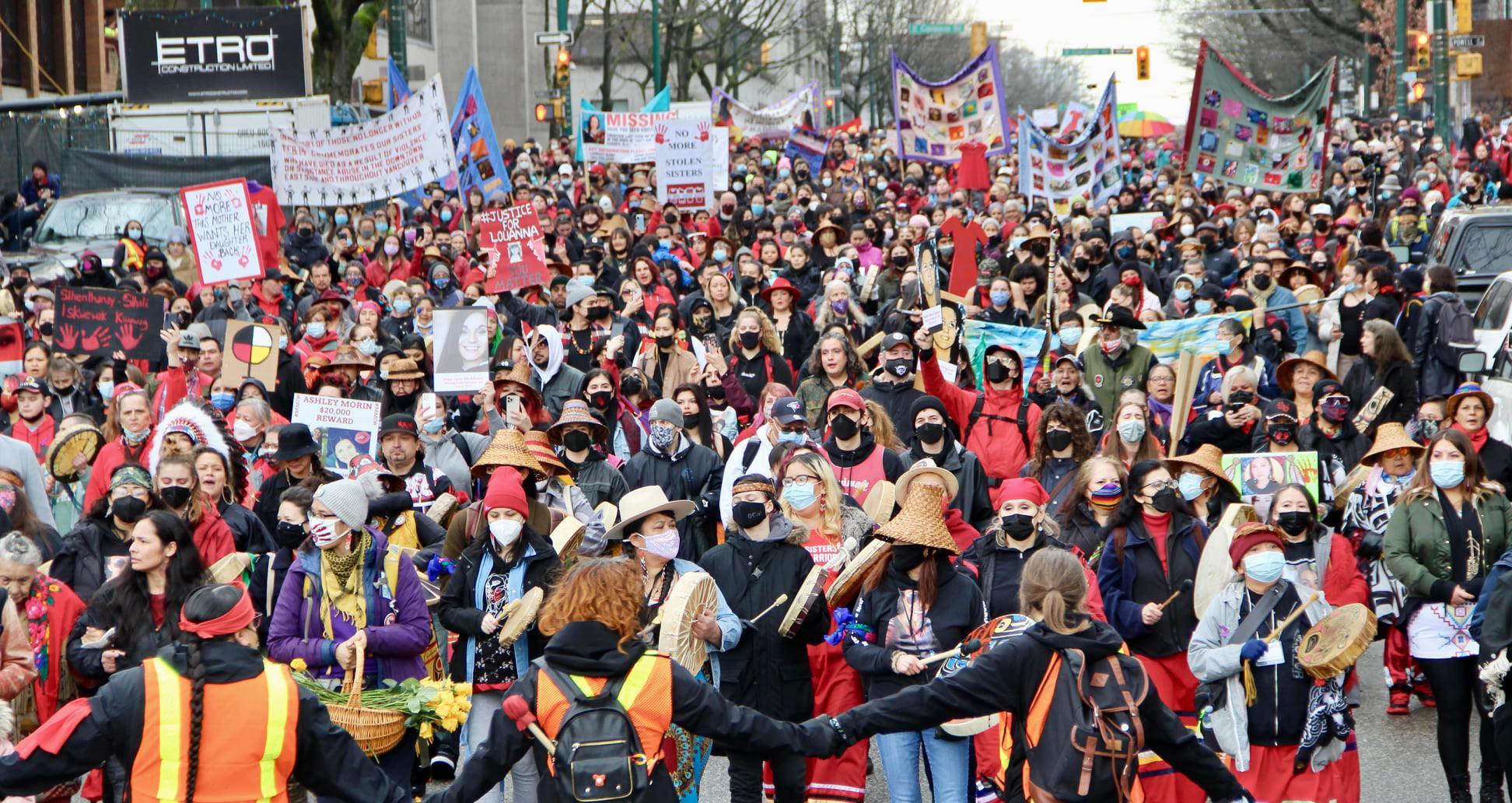
Vancouver, Women's Memorial March, February 14, 2022
Trudeau Government's Shameless Refusal to Fulfill Requirements of Calls for Justice
The annual February 14 marches to be held across Turtle Island to commemorate the lives of Missing and Murdered Indigenous Women and Girls (MMIWG) requires an assessment of where the government is at in fulfilling the Calls for Justice in the Final Report of the National Inquiry into Missing and Murdered Indigenous Women and Girls, released on June 3, 2019.
|
The Final Report issued 231 "Calls for Justice" to end violence against Indigenous Women and Girls as well as 2SLGBTQQIA (Two-spirit, Lesbian, Gay, Bisexual, Transgender, Queer or Questioning, Intersex, Asexual) people. It pointed out that these Calls are legal imperatives under international human rights law and oblige governments to take appropriate action. To date, the Trudeau government has done little to answer the "Calls for Justice." Its disinterest insults the memories of the thousands of Indigenous women and girls and 2SLGBTQQIA people who have died or gone missing and their families, Indigenous Peoples and Canadians.
On May 23, 2022, the federal government released its own report on the progress made since the "Calls for Justice" were issued including on a National Action Plan it issued in 2021. It speaks of policy objectives for more actions that "need to be taken to end the violence against Indigenous women, girls and 2SLGBTQQIA+ people" and that "More action is needed to address the colonial structures, institutions, agencies, legislation, services, policies, and programs, that continue to cause harms and loss of life, such as institutional and structural racism in health care, child welfare, policing, and the justice system."
The Native Women's Association of Canada (NWAC) pointed out on June 3, 2022 that the 2021 federal budget directed $2.2 billion over five years to address the genocide against Indigenous women, girls and 2SLGBTQQIA but that there were no plans and no indication as to how the money was going to be disbursed or what goals were going to be achieved. NWAC noted that the National Action Plan, as it was drafted, "was actually a recipe for inaction and the people represented by our organization are paying the price."
NWAC added that between 2015 and 2020 (under the Trudeau government's watch), Indigenous women accounted for 24 per cent of all female homicide victims in Canada even though they make up just five per cent of Canada's female population. "There is nothing to suggest that those crimes are on the decline," the organization adds.
The government expresses no shame when it confirms this in its own report: "According to a report published in 2022, Indigenous women, girls, and 2SLGBTQQIA+ people are still experiencing alarming rates of violence and are over-represented as victims of crime."
The fact is that its method of dealing with the Indigenous
peoples is to undermine dealing with them on a nation-to-nation
basis. Government agencies are setting up direct individual
relations with people of Indigenous origin or deal only with
often corrupt structures imposed by the Indian Act.
For example, the fight for compensation for survivors of the
genocidal residential and day schools is, like everything else,
turned into a matter of lawsuits. These schools are in
no small part responsible for the conditions in which Indigenous
women and girls are considered fair game.
On January 21, the federal government announced that it had agreed to settle a $2.8 billion class-action lawsuit with 325 First Nations seeking reparations for the loss of language and culture caused by the genocidal program of Indian residential schools. This settlement is said to give compensation at the band level, a structure that arises from the Canadian government's Indian Act. A previous settlement for survivors of day schools, or day scholars, was reached out of court in 2021 and paid individuals $10,000 each.
Meanwhile, the conditions remain dire on all fronts as the custodians of the racist colonial Canadian state and its constitutional order absolve themselves of any responsibility for taking immediate and appropriate action as laid out in the 231 "Calls for Justice" put forward in the MMIWG National Inquiry's Final Report.
To read the Calls for Justice click here.
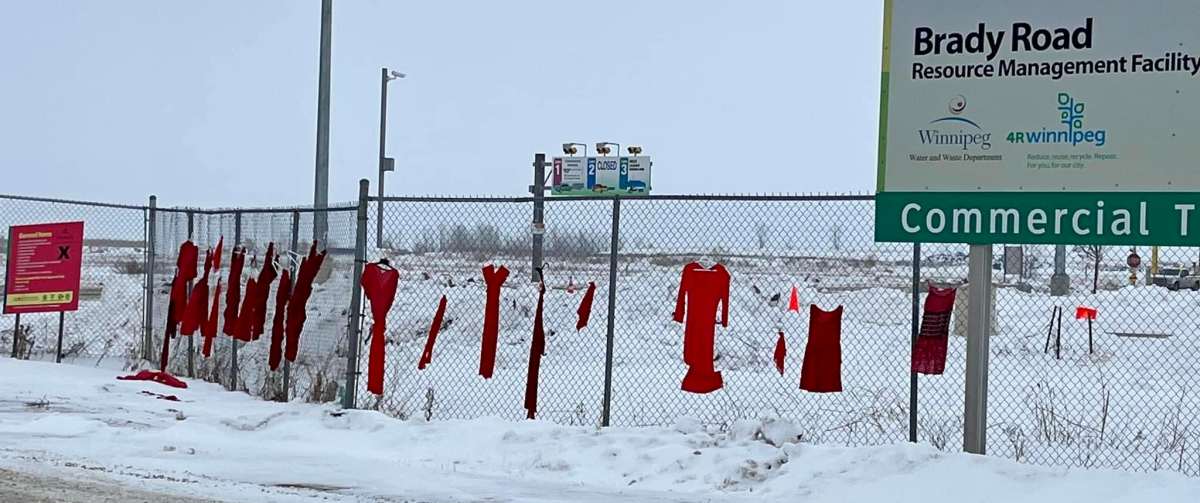
A ceremony was held January 19, 2023, at the Brady Road landfill
site in Winnipeg and 101 red dresses were hung along the fence.
( Photo: Southern Chiefs Organization)
First Ministers' Meeting on Health Care
Forms of Deception in the Name of
Fixing Health Care System

Demonstration in defence of right to health care outside First
Ministers' meeting, February 7, 2023.
The meeting of First Ministers in Ottawa on February 7, ostensibly to deal with health care funding, was a first category historical fraud. The communiqués and statements from the federal government, responses from premiers, media spin and counter spin was unprecedented for the amount of nonsense they contained and the new low they reached by marketing their announcements of billions for this and billions for that in the name of high ideals.
Prior to the meeting an effort was made to suggest there was a consensus that privatization is a problem but it can be resolved because the state will pay for private services and individuals don't have to; transfer payments can be tweaked to better meet policy objectives as defined by private consultants, a concession here by government merits a concession there by those involved in negotiations, and so on.
The fraud includes the claim that governments at all levels and the opposition parties are intent on adopting good policies to provide Canadians with the health care services they need. A plethora of proposals say what Canadians want most: dental care is pitted against pharmacare, mental health care, child care and so on.
Nothing they say or do, which the media faithfully repeat, is based on concrete reality. What polls and marketing and consulting firms declare is taken as the proof of what Canadians want. This gave rise to nonsense that cataract surgeries and knee and hip replacements are the most urgent problem and to hell with the all out destruction of the public health care system, the principle of universality, the abandonment of remote areas and old facilities, to hell with the failure of a system which no longer provides enough family doctors, emergency services, ambulance first responders, hospital beds and, most important of all, never mind about trashing the human factor/social consciousness.
The February 7 meeting was preceded by a meeting of the federal, provincial and territorial finance ministers. There the Minister of Finance/Deputy Prime Minister lectured that every province should up the ante on giving tax credits and incentives to financiers who will pony up to pay for infrastructure required as a result of the massive advances made by the technical and scientific revolution. The mantra was that the aim of Canada's economy must be to make sure it is competitive with the U.S. and the rest of the world. Nothing to do with making sure it meets the needs of Canadians or explaining a plan of action which puts everything on the table and meets the approval of the people of this country. They are left out of the equation altogether.
The announced agenda of said health meeting was to "sort out the funding arrangements between the federal and provincial authorities." In that regard it met expectations. It sorted out nothing and became the nasty squabble predicted over which level of government has what jurisdiction to do whatever it wishes with what are called transfer payments. In the increasingly distant past, transfer payments had to do with making sure there was universality of standards and everyone, no matter where they lived, could access health care services which they needed. Far from giving this principle new meaning, which is understood clearly as providing all Canadians with what they need in terms of health care, a major focus for the announcements from the First Ministers Meeting is an emphasis on "harmonizing health indicators."
Even this need is taken as a fait accompli and its aim is not defined in a manner which benefits the people. One issue is for Canadians to have access to their own health records in a timely fashion; another is the talk which confounds the principle of universality with the thrust to adopt "common standards and policies related to data" in a manner which denies the human factor/social consciousness.
The meeting purported to address the crisis in health care but excluded the people from any consideration in the deliberations and dismissed out of hand all the solutions and demands put forward by doctors, nurses, health care unions and others.This is unacceptable. The "solutions" take their cue from what investments and contracts tech companies providing health services say they require. In this regard, federal funding was announced for two agencies, Canadian Institute for Health Information (CIHI) and Canada Health Infoway (CHI), to manage and harmonize the health data of Canadians across different levels of government, with the stated aim to address the "fragmented" health care system.
The competition between private interests to capture the health information market is fierce. It has nothing to do with meeting the health care needs of the people and everything to do with defining health care as a commodity in the market system. In this system the workers who provide care are considered a cost which is to be disposed of wherever possible, to be replaced with instruments which use Artificial Intelligence (AI) to carry out analyses, diagnoses and treatments.
The fraud is the claim that provincial and federal
governments will solve the health care crisis by ignoring the
solutions clearly enunciated from coast to coast to coast by
health care workers. Fulfilling their just claims on matters
related to wages and working conditions will ensure a
health care system worthy of the name which can then also be
equipped with modern equipment and programs. But to base funding
of the health care system on modern digital equipment and
programs and eliminate the human health care providers qualified
in all the aspects required by a modern health care system is
not only ridiculous but shameless.
Looking after the health care of Canadians is not satisfied by
looking at it as a cost that is not in any way a benefit to
society. The level of discussion has been lowered to such an
extent that the rulers and their media do not even hear how
ridiculous their assertions sound, such as the claim that
because the services will be paid for by the public purse
Canadians do not have to worry about paying for it themselves.
No matter how much they try to detach the individual members of
society from their collectives and the individuals and their
collectives from the general interest of society, it will not
succeed. The relations are a material reality which will prevail
in the end, no matter how much governments try to tear them
asunder to maintain their control over the material and human
resources. The fraud is to deliberately ignore the concrete
needs of society and the people and, most importantly, leave the
people out of the equation and deliberation altogether.
Presenting their pretense to govern as representatives of the
will of the people is a real block to sorting out any problems
facing the people and their society.
The security of Canadians and health care workers at all levels lies in their fight for the right to timely health care services at the highest standards for all, in a system delivered and paid for in a manner which puts the human factor/social consciousness at the centre of its concerns. The working conditions of all those who work in the health care system -- referred to as an industry -- have a direct bearing on the health of Canadians. Everybody knows this. The market-driven deception of federal and provincial authorities is treachery of the first order. The revolving door of government ministers and private enterprise and the monies doled out to consulting firms and modern methods to collect data are not synonymous with providing human beings with the conditions they need to flourish and, unless they flourish, society will continue to stagnate and descend into anarchy and violence as we see escalating every day with disastrous results.
All out to join the health care workers in fighting for their just claims for wages and working conditions with belong to them by right! Without putting the activation of the human factor/social consciousness as the aim of the billions handed out here and there to further fragment the health care system, schemes are scams, fraud is fraud, and governments must be held to account by demanding they meet the demands of workers who provide their services in all aspects of the health care system, including long-term care and senior's homes.
For Your Information
Canadian Institute for Health Information
The Canadian Institute for Health Information (CIHI) is a publicly-funded body that has a mandate to speed up the improvement of health care delivery. Its Board is made up of heads of certain public hospitals and deputy ministers from the provinces and two members at large. One is Dr. Alexandra T. Greenhill "one of Canada's leading physicians in digital health innovation." She is the co-founder, CEO and Chief Medical Officer of Careteam Technologies, a digital health platform that "aims to use artificial intelligence to solve health care fragmentation and enable optimal health." She is also a Global Ambassador for Blackbox Connect powered by Google for Entrepreneurs, and Entrepreneur in Residence at Innovation Boulevard.
Clearly, publicly funded in no way provides a public health care system!
Careteam is a "health care-grade team collaboration platform" which claims to bring together health care professionals, the patient and personal support team with an integrated care plan, instant communications, and population analytics to enable transitions, complex chronic care, and innovation in a fragmented health care environment.
Why we have "a fragmented health care environment" in the first place and what is meant by that seems to be not worthy of an answer. The deliberate destruction of the public system by depriving it of an aim which provides health care to all Canadians is not to be discussed. Instead we are treated to market jargon and conclusions. According to CIHI's website: "We are concerned that the fragmentation of health care is getting worse, as there are more and more co-morbidities, options, apps and devices. Patients, families, clinicians and health organizations are overwhelmed by the noise. We need to make the health 'system' act as a system, starting for some complex and chronic health issues and also for multi-morbidity patients and integrated care systems. [...]
"Careteam's platform extends existing investment in technologies such as Electronic Medical Records (EMRs) and digital front doors with personalized actionable care plans enabling collaboration within and across multiple organizations."
We are to believe that providing investment technologies and digital front doors will replace the human factor/social consciousness. CIHI says:
"Everyone can work together on the same page, easing the burden of care on families and improving the health and lives of children. Deployable same day, configurable without coding and easy to adopt, we have helped many health teams succeed on their objectives."
Blackbox Connect, partnered by Google for Entrepreneurs is a mechanism through which Google trains a handful of "startup entrepreneurs from around the world," while they stay together in a mansion, and gives them access to "mentorship, intense training, and investors." Blackbox Connect was founded by Silicon Valley veteran Fadi Bishara, "in order to, 'inject global start-ups into the ecosystem, mindset and "magic" of Silicon Valley'; enabling entrepreneurs to access the expertise needed to expand their ideas, and develop a global marketplace strategy."
Canada Health Infoway
Canada Health Infoway was established in October 2000 with an initial investment by the Government of Canada of $500 million. It calls itself an independent, not-for-profit corporation. On January 22, 2001, Infoway was incorporated. Since inception, Infoway has received some $2.5 billion in public funds. According to their website "by integrating digital health into the health care experience, we unlock more efficient and accessible models of care. We facilitate faster, more seamless and secure information sharing. And we can help enable better health outcomes for all Canadians."
What a scam!
Its Directors are made up of deputy ministers who are involved in data and analytics in health, and former Ministers as well as entrepreneurs and business consultants in the field of health care. The Chair, Dr. Peter Vaughan Canadian Forces Colonel Commandant, is a former deputy minister. Also on the board is former Ontario Health Minister Dr. Eric Hoskins. He is now a partner at Maverix Private Equity which is made up of various Ontario-based venture capitalists such as Jim Balsillie (RIM), Arlene Dickinson (District Ventures) and John Bitove (Obylysk).
Canada Health Infoway has a number of projects:
e-Prescribing with PrescribeIT -- which they describe as Canada's not-for-profit e-prescribing service, (which) enables prescribers to electronically transmit prescriptions as data directly from their electronic medical record into a pharmacy's management system, removing the need for faxed and paper prescriptions.
Interoperability -- Infoway claims it is facilitating "a national collaborative effort to advance what is called interoperability in health care." It says: "While there are many interoperability-related challenges, the sharing of patient summaries across different solutions has been identified as a priority based on extensive consultations."
Patient summaries are "portions of health records comprised of a standardized collection of information. They enable a concise package of patient information to be accessed and updated by patients and clinicians, making it easier to share necessary information between care providers and settings (e.g., acute, primary and specialty care)."
Canada Health Infoway's website indicates that "a collaborative development process is underway, with the aim of publishing a pan-Canadian Patient Summary specification (PS-CA) for trial implementation by early 2022."
In November 2022 in Ontario, for example, the patient summary was begun and "its first iteration" includes:
- Medication Summary
- Allergies and Intolerances
- Problem List
- Immunizations
- History of Procedures
- Past History of Illness
Investments -- Infoway supports provincial, territorial and pan-Canadian efforts to implement effective virtual care initiatives,
Change Management -- the Virtual Care Change Management Program is aimed at ensuring that clinicians have the tools and training they need to help transform care and at improving digital health equity and literacy of the Canadian population.
Procurement -- Infoway is supporting interested jurisdictions to pre-qualify solution vendors through a cross-jurisdictional request for pre-qualification (RFPQ). These RFPQs are first stage procurement activities and will result in a list of pre-qualified solution providers.
Partners -- in "projects like the Mustimuhw Citizen Access Health Portal and Crisis Text Line powered by Kids Help Phone, Infoway works together with stakeholders to drive digital health adoption."
Essence of the Anti-Social Offensive

January 7, 2023 rally on Parliament Hill
The system called a social welfare state was dismantled when the neo-liberal anti-social offensive was launched alongside free trade in the mid 1980s. The essence of the anti-social offensive was not bad policies of the left- or right-wing governments and it is not the sum of its features which include "bad policy decisions," privatization, corruption, conflicts of interest, or that crimes are committed against the people by depriving them of health care facilities and humane treatment. All those things have indeed taken place but its aim was and continues to be to restructure the state so that all barriers to the ability of narrow private interests to usurp the decision-making powers of the state and abscond with the wealth of the people are eliminated.
Even the functions of the civil service and public sector are carried out by narrow private interests. Vicious attacks against unions have gone hand in hand with the passing of self-serving laws to justify stealing pension monies, EI funds and any other monies available to the working people to look after their well-being such as injured workers' compensation funds. The social welfare state and social contract under it have now been dismantled and vicious fights are taking place between rival factions of the ruling class itself to do whatever they can get away with to pay the rich.
The first wave of assault on society was done in the name of paying down debts and eliminating deficits. Between 1986 and 1991, the federal government cut $35 billion from transfer payments for health, education and welfare to the provinces. During the same period, the federal government alone paid more than $422 billion to the rich in the form of interest payments on the debt. This was tantamount to paying the original debt inherited after World War II at least forty times over. The federal government then announced it would pay $88.5 billion in interest charges in the following two years.
Government at that time simply wanted to take more money by cutting back on services, privatizing and eliminating workers' defined pension plans in favour of defined contribution plans where they could increase the size of funds available to themselves.
Laws were passed such as those criminalizing deficits or defrauding workers of their pension funds, injured workers of funds which belonged to them by right, and so on. It was a form of criminal fraud to cover up the real aim to pay the rich, not to reform the health care system to meet a social aim, let alone the needs of modernizing a health care system based on the principle of universality or people's needs and the needs of society itself.
The propaganda that paying down debts and deficits for the betterment of society would have "trickle down effects" was exposed when the rich got richer and the poor poorer and more numerous. The propaganda was and continues to be self-serving and deliberate lying to cover up the aim of paying whatever narrow private interests have seized the decision-making powers of the state at any time. Big Pharma during the pandemic, the U.S. war machine's demand for critical minerals and mining rights on Indigenous lands and more spending on U.S. armaments, or money to private developers in the name of meeting housing needs, are all par for the course.
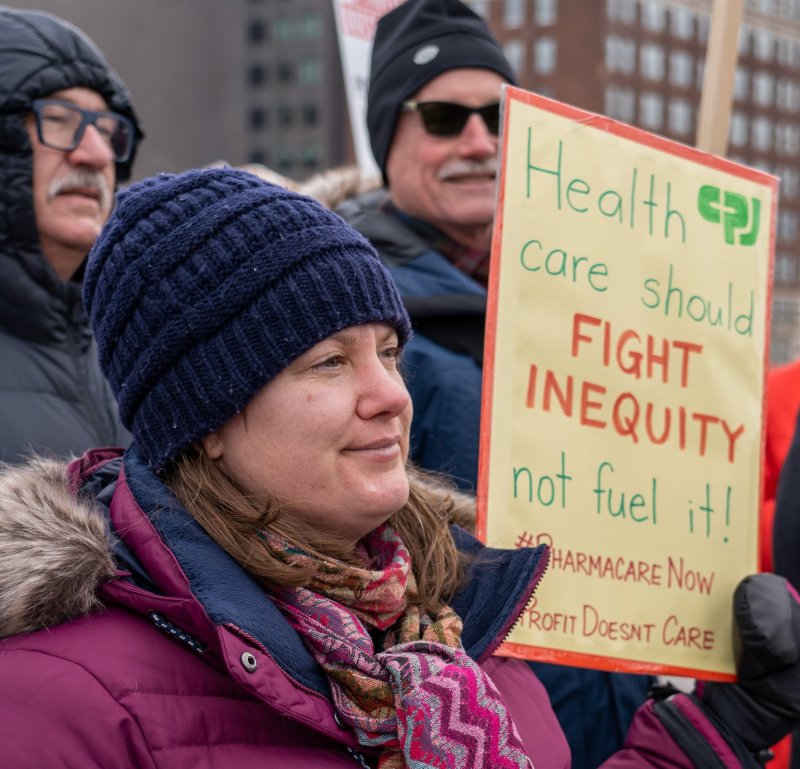 Historical fraud was committed
when the aim of society to serve the public good was changed
without the permission of Canadians. To this day as concerns
health care, the same people who changed it, speak as if the aim
remains what it was in the past -- universality. Then they say
their schemes to pay the rich are all lawful even though they
make up the laws as they go along. Their only dilemma today is
not to fix the broken health care system but to crush the
opposition to their moves to remove any limitations contained in
previous legal frameworks on their ability to act with impunity.
Everything they do they claim is legal no matter how much they
violate their own laws and interpret them self-servingly.
Historical fraud was committed
when the aim of society to serve the public good was changed
without the permission of Canadians. To this day as concerns
health care, the same people who changed it, speak as if the aim
remains what it was in the past -- universality. Then they say
their schemes to pay the rich are all lawful even though they
make up the laws as they go along. Their only dilemma today is
not to fix the broken health care system but to crush the
opposition to their moves to remove any limitations contained in
previous legal frameworks on their ability to act with impunity.
Everything they do they claim is legal no matter how much they
violate their own laws and interpret them self-servingly.
The fraud of the Trudeau government is not simply providing a false bill of goods peppered with false promises to cover up crimes and block opening society's path to progress. Their ultimate argument is to declare that the past can be turned into the present by changing it after the fact, such as declaring they are guided by the principle of universality in health care funding. Their present is not contingent on the actual situation as it exists but on ahistorical abstractions presented as self-evident truths which they claim tell us what is necessary.
The fraud is to deliberately ignore the concrete needs of society and the people and, most importantly, leave the people out of the equation and deliberation altogether. This makes their pretense to governance that represents the will of the people a real block to sorting out any problems facing the people and their society.
Governments who provide a false bill of goods argue that individuals are not one with their collectives and that their individual and collective interests do not have to be harmonized with the general interest of society. All it proves is that the individuals who have usurped the reins of power are not fit to government and that it is up to the people to provide the definition of the principle of universality and what is required to affirm the right of Canadians to healthcare.
Providing Canadians with the health care services they need is a number one priority today and it starts by providing health care workers with the wages and working conditions they are demanding.
Health Care Is a Right!
All Out to Uphold the Rights of Health Care Workers!
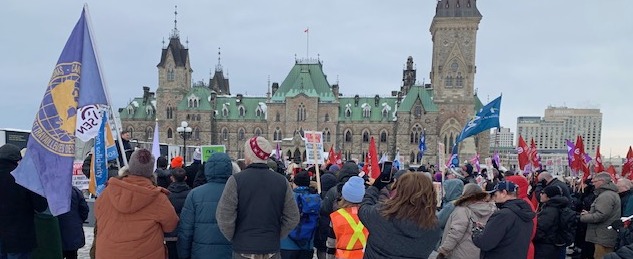
Parliament Hill, February 7, 2023.
Ontario Government's Reduction of Medical Wait Times by Financing Private Clinics

Demonstration in Toronto against Ford government's health care
plans, December 12, 2022.
On January 16, the Ford government in Ontario announced a three-step plan to enable private health care facilities to undertake certain types of surgeries and other medical procedures, "to eliminate surgical backlogs and reduce wait times" through private clinics, which it refers to as "community surgical and diagnostic centres."
In its January 16 announcement, it claims, "There are currently 206,000 people estimated to be waiting for surgical procedures. For reference, last fall, there were approximately 209,000 patients waiting for a hospital operating room-based surgical procedure in Ontario, and about 200,000 before the pandemic." It says its plan will return wait lists to pre-pandemic levels by March 2023, barring any "operational issues."
In Step One, the government proposes to tackle the backlog in cataract surgeries by contracting private health facilities in Windsor, Kitchener-Waterloo and Ottawa to perform an additional 14,000 cataract surgeries each year, which according to the government represents some 25 per cent of the "province's current cataract waitlist, and accounts for the estimated COVID-related backlog of cataract surgeries." The government adds that it is investing more than $18 million in existing private medical facilities to undertake "more than 49,000 hours of MRI and CT scans, 4,800 cataract surgeries, 900 other ophthalmic surgeries, 1,000 minimally invasive gynecological surgeries and 2,845 plastic surgeries such as hand soft tissue repair."
In Step Two, the Ontario government plans to expand the capacity of private community surgical and diagnostic centres to address regional needs regarding "cataracts, as well as MRI and CT imaging, colonoscopy and endoscopy procedures." It said the focus will be procedures that are "non-urgent, low-risk and minimally invasive and, in addition to shortening wait times, will allow hospitals to focus their efforts and resources on more complex and high-risk surgeries."
In Step Three, the Ford government plans to introduce legislation in February to enable private diagnostic centres "to conduct more MRI and CT scanning so that people can access publicly funded diagnostic services faster and closer to home. Starting in 2024, this next step will also expand surgeries for hip and knee replacements." The government adds that the legislative changes will also "strengthen oversight of community surgical settings so that patients can continue to expect to receive the world class care they know and deserve and provide the province with more flexibility to continue to expand access to more surgeries and further reduce wait times."
The Ford government announced as well that as Ontario "expands the role of community surgical and diagnostic centres, Ontario Health and the Ministry of Health will continue to work with system partners and clinical experts to put in place the highest standards for quality and safety." Premier Ford also stated to the press that these changes will be permanent.
Surgical Backlogs and Pertinent Questions
A report issued by the Ontario Medical Association (OMA) in February 2022, titled A Three-Stage Approach to Addressing Ontario's Critical Surgical and Procedural Wait Times pointed out, "Under the province's current structure, hospitals have been regularly operating at 100 per cent or greater capacity. OMA analysis suggests that the health-care system would need to work at 120 per cent capacity for up to 31 months to clear most of the backlog. In May 2022, the OMA said there was a backlog of nearly 22 million health care services, including 1 million surgeries.
The OMA data follows a recent report by the province's Financial Accountability Office that showed it will take more than three years and $1.3 billion to clear the backlog of surgeries and diagnostic procedures in Ontario. Persistent delays have detrimental impacts on both patients and providers that compound the challenges that need to be addressed."
In May 2022, the OMA also said that the Ontario government should:
- Invest money for staff, infrastructure and a streamlined system to reduce wait times and service backlogs.
- Expand mental health and addiction services.
- Improve and expand home and other community care to reduce reliance on hospitals and long-term care.
- Strengthen public health and pandemic preparedness.
- Give every patient a team of health-care providers that can interact digitally, as there are 1.3 million Ontarians who currently don't have a family doctor.
Some pertinent questions that come to mind.
Where did the government get its figures about the backlogs, and why is there such a discrepancy from the figures provided by the OMA?
Why is it prioritizing cataract procedures, or any of the other procedures to be dealt with in its plan? What these surgeries have in common is that they both require implantation of medical devices – cataract surgery involves placing an artificial lens, while joint surgery involves a prosthesis or artificial joint. Both provide the opportunity to "upsell" from the standard provided through the OHIP system, with patients offered a "choice," paying the cost difference which can be thousands of dollars, making these clinics highly desirable for private interests who are interested in maximum profit.
Further questions include, that if the government has not identified, quantified and qualified the size and nature of Ontario's surgical backlog, then what is the aim of its three-step plan?
What is happening to address the longstanding demands of health care workers for proper working conditions which are the guarantees for patients' well-being?
(With files from Government of Ontario, OMA, CBC)
Actions in Ontario in Defence of Public Health Care
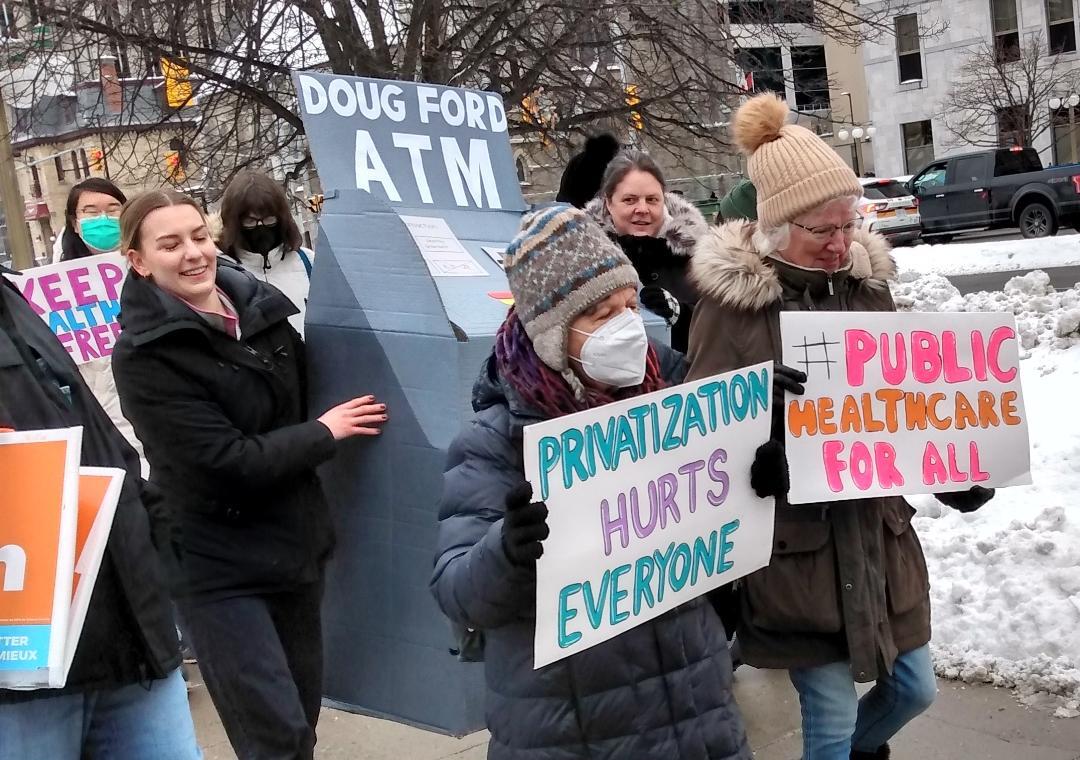
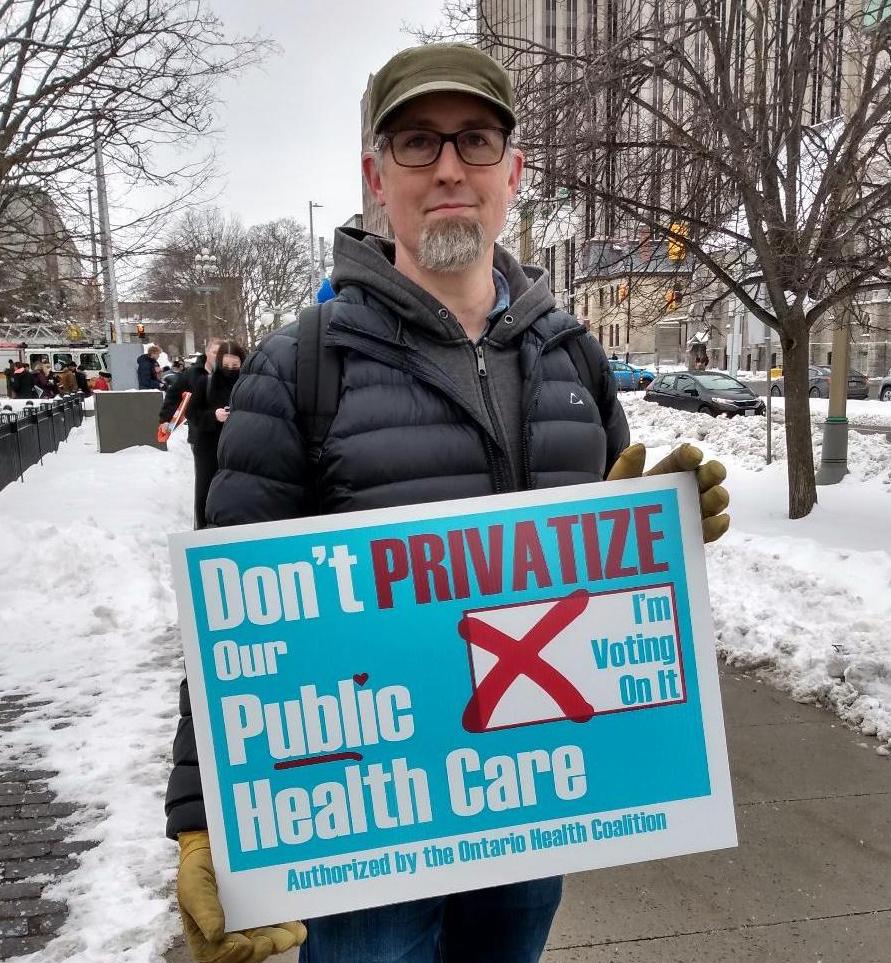
Ottawa demonstration for public health care, January 19, 2023.
Health care workers in Ontario and their organizations have opened the new year by speaking out in defence of public health care, including the working conditions they require to provide the care their patients require.
In a joint media statement issued January 16, five unions representing nurses and other health care workers called on the Ford government not to move forward with its plan to divert money from public hospitals into private surgical clinics.
The unions -- the Ontario Council of Hospital Unions (CUPE), Ontario Nurses' Association (ONA), OPSEU/SEFPO, SEIU Healthcare and Unifor -- explained the plan, whose purported aim is to reduce wait times and backlogs for surgery and diagnostic procedures, will do the opposite because the changes will come at the expense of the existing public health care system.
The health care unions go on to explain that since coming to office, the Ford government's policies have exacerbated working conditions while lowering wages, leading to high rates of staff turnover, worsening the staffing shortage and burnout. In such a situation, funding private clinics will further damage the ability of Ontario's public hospitals to provide high-quality care and retain frontline staff.
Bernie Robinson, Interim President of the ONA, decried that the government "is creating a two-tier system where those who can pay out of pocket will jump the queue to receive their surgery and treatment first. Nurses and health care workers need more support and better funding in the public system, not a plan that will simply divert public dollars into the hands of private shareholders. Nurses call on Premier Ford to abandon this disastrous plan and invest in the public system to ensure access for all."
The nurses' professional associations, the Registered Nurses' Association of Ontario (RNAO) and the Registered Practical Nurses Association of Ontario (WeRPN) similarly spoke out against the Ford government's plans.
Dr. Doris Grinspun, the CEO of the RNAO noted in the organization's January 16 press release, that besides the fact the not-for-profit health care costs less and delivers higher quality, "health care services delivered through for-profit facilities are first and foremost accountable to their investors, not to patients." Such arrangements that expand "the scope for investor-driven health care changes the political dynamics in our health care system. The forces lobbying for a U.S.-style, profit-driven system are strengthened [while] the public is left to fend for themselves in a deteriorated public system."
The RNAO emphasized that if the government's aim is to address backlogs and other problems, the RNAO and others have already proposed solutions. For example, more nurses can be hired and then operating rooms can be run around the clock. High volumes of standardized procedures (such as cataract surgeries) can be performed at specialized centres within hospitals or at other sites that already exist in the public health care system.
As concerns nurses' wages and working conditions, the RNAO explained, "The only way forward is to make sure nurses receive competitive compensation, including the repealing of Bill 124, so they can keep working in Ontario and build their careers. Nurses also deserve healthy work environments that have manageable workloads to deliver the best care possible to all Ontarians."
Dianne Martin, CEO of WeRPN, elaborated further on the issues facing nurses in the public sector: "In the face of our nursing shortage, Ontario has already become over-reliant on for-profit nursing agencies that provide nurses who are less familiar with the practice settings and patient populations at triple the cost to the taxpayer." WeRPN is calling on the government to make meaningful investments to strengthen Ontario's public health system to retain nurses presently in the system. For example, it proposes that nurse-to-patient ratios be implemented, that there be competitive and harmonized wages across all health sectors, and that access to specialized education to meet the needs of the health system be expanded.
(With files from RNAO, ONA, WeRPN.)
Upcoming Actions to Support Ontario Nurses as Negotiations Begin
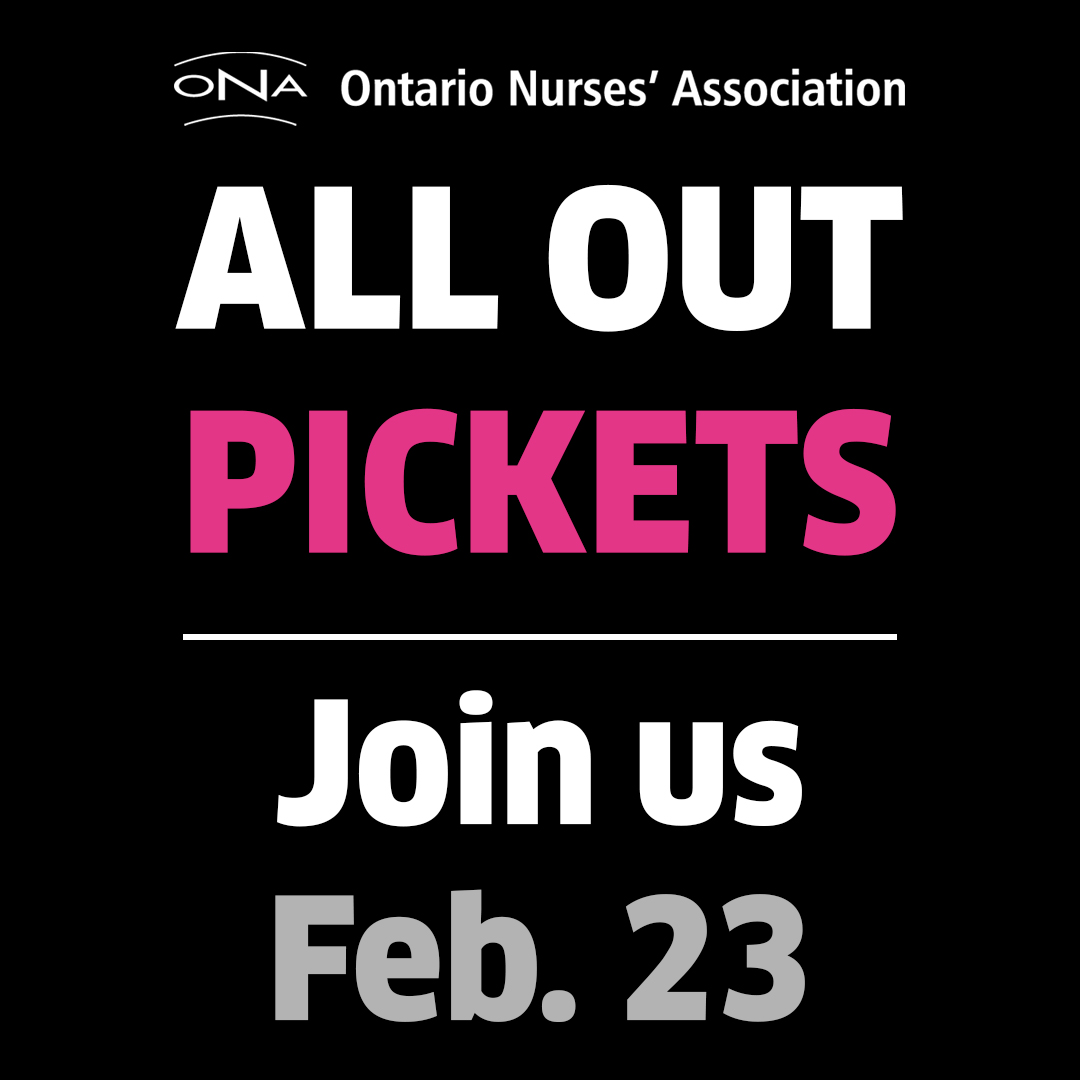 On February 23, members of the
Ontario Nurses' Association (ONA) and allies will join "all-out
picket actions" in communities across the province. The pickets
will be held outside hospitals and Conservative MPPs' offices to
"show our unified voice and commitment to achieving a fair deal
for Ontario's nurses." ONA says.
On February 23, members of the
Ontario Nurses' Association (ONA) and allies will join "all-out
picket actions" in communities across the province. The pickets
will be held outside hospitals and Conservative MPPs' offices to
"show our unified voice and commitment to achieving a fair deal
for Ontario's nurses." ONA says.
The pickets are in advance of the All-Out Shutdown Protest called by ONA for Thursday, March 2, at 12 pm at the Sheraton Centre Hotel in Toronto.
Ontario nurses represented by the ONA began their negotiations with the province on January 30. "Ontario cannot afford anything less than a better deal for nurses and their patients," said ONA Interim Provincial President Bernie Robinson. "ONA is putting the Ontario Hospital Association on notice that the days of nurses and health care professionals swallowing unconstitutional wage caps and untenable working conditions are over. Retaining our desperately needed hospital nurses and addressing the critical staffing shortages hurting patient care requires a better deal for nurses and our patients."
ONA's top-two issues are staffing shortages and wages. Nurses are demanding better wages that reflect the rising cost of living and restore the wages they have been unjustly deprived of for the past three years by Premier Ford's unconstitutional Bill 124. Under this recently overturned anti-worker legislation, the wages and benefits of public sector workers have been limited to increases of one per cent per year, leading to a severe nursing shortage and exacerbating already untenable workloads and patient wait times. Other issues include changes to support better staffing levels and enable nurses to provide timely and high-quality care for Ontarians.
Robinson notes that addressing inadequate wages will help address staffing shortages. "By increasing wages, it is more likely that we can retain nurses considering leaving their jobs, and that many nurses who have left the system these past few years may be recruited back into our hospitals. This would ease the nursing shortage and improve patient care."
"We urge the public to show support for nurses and health-care professionals in our fight for a better deal," says Robinson. "Ontario's hospital nurses and health-care professionals are united in their resolve to achieve a better deal that will ensure Ontarians get the care they need and deserve." Robinson notes the public can visit Value Nurses to show their support.
To find a picket near you, click here.
ONA represents more than 68,000 registered nurses and health care professionals, as well as 18,000 nursing student affiliates, who provide care in hospitals, long-term care facilities, public health, the community, clinics and industry.


ONA members hold a social media day of action on February 2,
2023, in support of their bargaining demands.
(With files and photos from ONA.)
More Attempts to Divest Governments of Constitutional and Legal Limitations
Fast-Tracking Approval of Mining Projects
Canada is fast-tracking approval of various critical minerals
mining projects. The process is marketed in the name of
protecting biodiversity and reducing negative contributors to
climate change. This is where Prime Minister Trudeau was headed
with his remarks addressed to the COP15 Summit on Biodiversity
held in Montreal in December 2022. According to Trudeau, as part
of Canada's effort to reach the COP15 worldwide goal of
protecting 30 per cent of land and marine areas by 2030, the
federal government will include close to 1 million square
kilometres of land and marine regions as "protected areas."
Responding to journalists' questions, he said that logging and
mining projects on the land portion of these "protected areas"
are not excluded as long as they are carried out in a
"responsible" way.
These "protected areas" stretch along the shorelines of the
James Bay-Hudson Bay area in Northern Ontario and Quebec, and
along the coasts of Nunavut, the Northwest Territories and
northwest British Columbia. The marine part of these protected
areas, beyond what is referred to as the "low water mark" linked
to ocean tides, falls under federal jurisdiction. The land
portion of these protected areas is generally what is considered
a shared federal/provincial/territorial and Crown jurisdiction
when it comes to environmental protection.
Earlier in the fall, federal, provincial and territorial governmental ministries and agencies agreed to fast-track the approval of proposed mining projects through what is called an Impact Assessment Study (IAS). Each level of government uses an IAS to produce its environmental impact study based on its own criteria and time frame.
Last October, in a speech given at the Canadian Club in Toronto, Minister of Natural Resources Jonathan Wilkinson said there is a clear need to find ways to develop projects "more rapidly than what we have been able to in the past." Energy and critical minerals projects need to be fast-tracked, he added. He said that what he had in mind is to coordinate federal and provincial IASs so as to shorten the period between the time a mineral deposit is discovered and the actual surface/underground extraction and initial processing of critical minerals. This is presently in the order of 12 to 15 years, he said.
A case in point is the recent approval by the federal and Ontario governments of a palladium-copper mine project located 10 kilometres from Marathon, in northern Ontario.
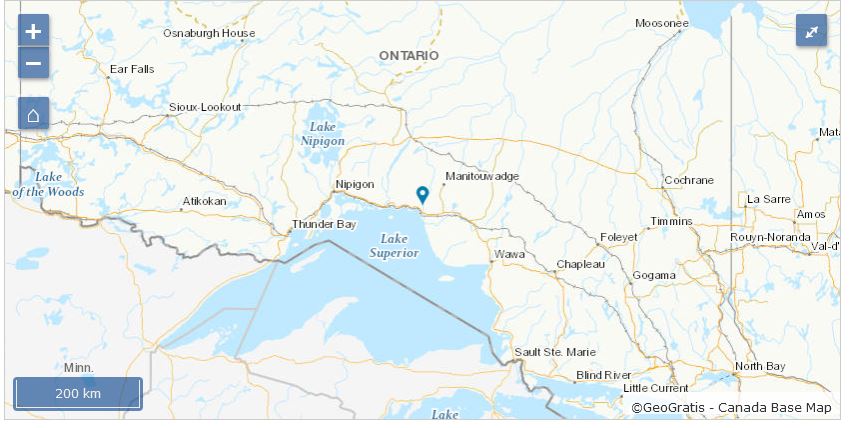 Map showing location of Generation Mining
palladium-copper mining project (Government of Canada).
Map showing location of Generation Mining
palladium-copper mining project (Government of Canada).
On November 30, Steven Guilbeault, Federal Minister of Environment and Climate Change, and David Piccini, Ontario Minister of the Environment, Conservation and Parks, announced that Generation Mining Limited's Marathon Project can proceed with the construction and operation of "three open pits to produce copper concentrate, consisting primarily of copper, palladium and platinum, critical minerals, an onsite ore processing facility, a 115 kilovolt transmission line, an access road" and other infrastructure needed to ship the ore concentrate "to a third-party facility for further downstream processing into refined critical minerals."[1]
Other byproducts to be extracted from the mine will include platinum, gold and silver. Palladium and platinum are part of the platinum group metals (PGM) that also include ruthenium, rhodium, osmium, and iridium. PGMs are very much sought after because of their unique physical and chemical properties that include: excellent high-temperature characteristics; resistance to corrosion (oxidation), including being nonreactive to weak acids; this resistance to oxidation makes them a catalyst for the electrolytic production of hydrogen; use in hydrogen fuel cells that combine hydrogen and oxygen to create electrical energy.
Already in 2012, the International Platinum Group Metals Association described their use in this way: "PGMs play a vital role at the heart of everyday living. One in four goods manufactured today either contains PGMs or has PGMs play a key role in their manufacture. These noble metals will also be central to our future choices in the fields of power generation, transportation, health care and a host of other areas." These other areas include "Electronic equipment used by the military [that] has platinum wiring and coating on the circuits which are crucial for functionality. Fuel cells with platinum catalysts are widely used in the military for soldier portable power, submarines, warships, and unmanned aerial and ground vehicles."[2]
Commenting on the announcement, Jamie Levy, President and CEO of Generation Mining said, "We would like to thank Biigtigong Nishnaabeg and the Town of Marathon for their support, along with the representatives of other regional municipalities and Indigenous communities, the public, the responsible federal and provincial government agencies, and our team of employees and advisors for their significant contributions to the Joint Review Panel Environmental Assessment process. We are extremely proud to be the first mine in Ontario to be approved through this process."
He and his company and the previous owners of the Marathon deposit had been sitting on the mining claims for more than a decade, self-servingly waiting for the "perfect financial conditions" to come along, meaning government lifting the limitations on public control of environmental assessments and what constituted protected areas.
Already in June 2012, the previous owner of the Marathon palladium-copper deposit, Stillwater Canada Inc., filed a detailed 43-page Environmental Impact Statement Report with the federal Canadian Environmental Assessment Agency and the Ontario Ministry of the Environment.[3]
At that time the world market price for palladium was $600 per ounce, a price considered by many mining financial analysts as "undervalued." The Marathon mining project was put on hold for almost seven years until Generation Mining Limited took over a majority share of 51 per cent in the project in June 2019, at a time when the price of palladium had skyrocketed to $1,500 per ounce, and a 100 per cent ownership in December 2021, when the price of palladium hit close to $2,000 per ounce, then an historic record high of $2,982 per ounce on March 4, 2022.
To say the concerns are environmental is a farce and fraud to cover up the real aims and motivation.
 Market price per ounce of palladium
2008-2022 (Macrotrends).
Market price per ounce of palladium
2008-2022 (Macrotrends).
Generation Mining Limited's Marathon Project
The federal and Ontario governments have collaborated to fast-track the approval of Generation Mining Limited's Marathon Project to proceed with the construction and operation of three open-pit mines. The story behind the Marathon mine approval is in stark contrast to statements by media pundits that governments are not doing enough to fast-track critical mineral mining projects. In an opinion piece December 29, 2022, entitled "Shift the focus of EV strategy to critical minerals," the Globe and Mail editorial board writes: "The biggest culprit, which Ottawa acknowledged in launching a new critical minerals strategy earlier this month, is extraordinarily slow regulatory approvals.... Ottawa and the provinces should co-operate on producing a single review for each proposal rather than running concurrent ones, and on setting firm timelines for each decision.... Regulatory problems are so well documented that, if minerals are the priority that governments claim, changes should be possible in a matter of months."
To ensure that the narrow private supranational mining interests are catered to, the opinion piece concludes: "Last April, Ottawa proposed a 30-per-cent exploration credit for critical minerals. The federal government needs to determine if further tax measures are needed to compete with the array of mining incentives that the U.S. has recently advanced and, if so, have those ready for the next budget. Governments also need to prioritize projects where they can help get infrastructure built quickly."[4]
The Canadian and Quebec working people have nothing to gain by supporting such proposals that will not only further enrich big narrow private interests and run roughshod over the treaty and hereditary rights of Indigenous Peoples, but will also further integrate the economies of Ontario and Canada into the U.S. war economy.
Notes
1. "Generation Mining Announces Federal and Provincial Approval of the Marathon Project Environmental Assessment," Financial Post, November 30, 2022.
2. "25 Prominent and Promising Applications Using Platinum Group Metals," Fact Sheet, International Platinum Group Metals Association, 2012.
3. "Marathon Platinum Group Metals and Copper Mine Project -- Project information about this environmental assessment," Environment and Energy of Ontario.
4. "Shift the Focus of EV Strategy to Critical Minerals," Editorial Board, Globe and Mail, December 29, 2022.
(With files from Government of Canada, Government of Ontario, Globe and Mail, Financial Post, Generation Mining, Macrotrends)
Quebec Mining Act Grants Private Interests Unfettered Rights
During the COP15 Biodiversity Conference in Montreal in December 2022, one issue that came up is that many countries with vast territories, such as Canada and the United States, have had mining laws in place for over a century that allow individuals, private organizations and government agencies to become owners of the bedrock that lies under privately and publicly owned lands. And it is happening despite the fact that governments are creating what they call "conservation areas," deemed to be "protected" from logging and mining operations.
Under Section 56 of the Quebec Mining Act, an applicant (an individual acting on their own or on behalf of a private organization) acquires the "real and immovable mining rights" to the bedrock located underneath a property once the "entry in the public registry" of a mining claim has been made.
These days, anyone can acquire a mining claim for less than $45 with a simple click online from a computer. Once acquired, under Section 64, the claim confers on its holder an "exclusive right to explore for mineral substances on the parcel of land subject to the claim." The claim holder can then renew it indefinitely at little cost, conduct drilling work and eventually operate a mine if a mining lease is obtained.
The same rights are given to the Crown under Section 61 of the Quebec Mining Act which stipulates: "A claim registered in favour of the state remains in force for the period and on the conditions determined by the Minister, who may dispose of it for the price and subject to the conditions determined by the Government."[1]
What these examples show is that past and present governments in Quebec have made changes to that legislation, often cosmetic, without touching its essence. The Mining Act grants narrow private interests unfettered rights to do as they please.
Quebec Mining Act and the New "Klondike"
The southern Quebec regions are currently under enormous pressure because of vast land acquisitions, thanks to the claim-staking allowed under the Quebec Mining Act, which is decried by many residents and Indigenous communities. Already nine regional county municipalities (MRCs), representing 142 municipalities have asked the Quebec government to impose a moratorium on claim-staking until a proper review can be done of the Mining Act, which was last revised by the Marois PQ government in 2013. They have in mind an overhaul of the Mining Act and the rules concerning Territories Incompatible with Mining Activities (TIAM). so that the Act doesn't conflict with human activities in and around municipalities and conservation areas where biodiversity thrives.
The Quebec counterpart of Mining Watch, Pour que le Québec ait meilleure mine, an organization that closely follows mining operations in Quebec from an environmental perspective, issued a statement on November 21 calling for a moratorium on mining claims. Due to the recent frenzy for minerals containing graphite, lithium, nickel, copper, and cobalt -- deemed critical to the manufacture of various varieties of rechargeable lithium-ion batteries -- "there has been an average 107 per cent increase in mining claims over the past two years in the three southeastern regions of Quebec analyzed. The following increases are reported: the Eastern Townships (+63%), the Lower St. Lawrence (+88%), and the Gaspé-Magdalen Islands (+139%)."[2]
 Map of Southwestern Quebec showing mining
claims (in red), parks and reserves (in green) and
Map of Southwestern Quebec showing mining
claims (in red), parks and reserves (in green) and
rivers and lakes (in blue).
Connectivity and Integrity of Natural Environments at Risk
The same organization goes on to say that "Hundreds of mining claims are located close to large national parks or within valued natural areas such as wildlife reserves and regional parks, threatening the integrity and connectivity of these areas of conservation interest."
In an earlier statement, the same organization said, "In the last 18 months, the number of mining claims has more than doubled. In southwestern Quebec, there are now more than 15,000 claims, 56 per cent of which have been acquired since January 2021." This region extends northward to the Abitibi border, in what is known as the Grenville geological province containing rocks more than 1.2 billion years old. It is a huge area that extends over 1,500 kilometres north of the St. Lawrence River, from Georgian Bay in Ontario to the Lower North Shore of Quebec, up to the Newfoundland-Labrador border.
The rock formations of this geological province are known to have deposits of minerals containing lithium and graphite, much coveted by mining companies. Their extraction is essential to the Legault government's "world battery hub" in the Bécancour area where the Quebec and federal governments are pouring hundreds of million of dollars in public funds.
 Map showing the extension in Eastern Canada,
of rock formations, part of the Grenville Province.
Map showing the extension in Eastern Canada,
of rock formations, part of the Grenville Province.
This critical mineral extraction and processing along Quebec's St. Lawrence River is part of the U.S. "Securing a Made in America Supply Chain for Critical Minerals," a partnership to which Canada is a signatory. It is also part of the federal government's Canadian Critical Minerals Strategy, which too is intimately linked to its role in this partnership of securing a critical minerals supply chain for the U.S. war machine.
Notes
1. Mining Act, June 2, 2022, Quebec, pages 13-14.
2. "Mining Claims: The Urgency of a Moratorium, Pour que le Québec ait meilleure mine," miningwatch.ca, November 21, 2022.
(With files from Quebec government, Pour que le Québec ait meilleur mine.)
Organization Demands Integrated Planning
and
Development of Mined Land in Quebec
Referring to the Quebec Mining Act, the organization Pour que le Québec ait meilleure mine (Mining Watch counterpart in Quebec) notes, "In addition to allowing drilling to take place without environmental assessment and public consultation, it is virtually impossible to revoke mining claims under current laws. The presence of mining claims for many years (often for speculative purposes) prevents integrated land-use planning, as well as environmental conservation during this period."[1]
Premier Legault promised last August, before the Quebec election, that no mining project would be carried out "without social acceptability."
Pour que le Québec ait meilleure mine quotes a recent Léger poll that "three out of four people in Quebec (75%) say they are in favour of "banning all mining projects in tourist or resort areas;" a similar proportion (78%) want to "require the consent of local populations (e.g., municipalities, Indigenous Peoples) before authorizing any mining activity on their territory;" and almost all (89%) want to "prohibit the dumping of mining waste in any lake, river or sensitive ecological area." This is expressed in the form of people in many local communities, including Indigenous ones, organizing to oppose these mining projects of so-called metals for a "green economy" in which they have no decisive say.
Indigenous Peoples and the Quebec Mining Act
Some experts have examined the Quebec Mining Act in relation to Indigenous Peoples. One of them, Sophie Thériault of the University of Ottawa's Faculty of Law, in a 2010 article, "A Mining Regime Based on the Outdated Principle of 'Free Mining,'" stated:
"Although it has been modified several times since the adoption of the first mining law in 1880, to this day the Quebec mining regime remains anchored in the principle of 'freedom of mineral exploration,' better known as 'free entry mining,' or simply 'free mining.' [...] At least one study of the Yukon and the Northwest Territories has concluded that the institutions derived from the principle of 'free mining' and Aboriginal title protected by section 35(1) of the Constitution Act, 1982 are irreconcilable. The conclusions of this study are, in our view, equally valid with respect to the Quebec mining regime, at least on territories where the Aboriginal rights of the Indigenous Peoples have never been ceded or extinguished," which is the case for much of the territory occupied by Indigenous Peoples in Quebec.[2]
On December 6, 2019, in Quebec Superior Court, the Mitchikanibikok Inik First Nation of Kitiganik (the Algonquins of Barrière Lake, in the Temiscamingue area) filed an "application for permanent Review and Permanent Injunction." In the eight-page document left with the court, it "challenges the constitutionality of certain sections of the Mining Act" pursuant to Sections 35 and 52 of the Constitution Act, 1982."
The document goes on to say that "the Applicant brings this application because the Respondent [the Government of Quebec and Minister of Energy and Natural Resources] maintains an Act (and related policy) under which it does not consult the Applicant prior to registering, renewing, or transferring mineral claims upon the Applicant's unceded Indigenous territory, as it must under Section 35 of the Constitution Act, 1982. Consultation is necessary so that the Respondent identifies and accommodates Aboriginal rights which may be adversely affected by mineral claims granted to others under the Act."[3]
The Legault government intervened in Quebec Superior Court with its battery of lawyers in September 2021 to try to stop the application for an injunction from going ahead. The December 6, 2019 application for an injunction would declare sections 56, 61, 65 and 72 of the Quebec Mining Act unconstitutional.[4]
The outcome of that intervention is not yet known.
Notes
1. "Mining Claims: The Urgency of a Moratorium, Pour que le Québec ait meilleure mine," miningwatch.ca, November 21, 2022.
2. "Rethinking the Foundations of Quebec's Mining Regime with Respect to the Crown's Duty to Consult and Accommodate Aboriginal Peoples," Sophie Thériault, McGill Journal of Sustainable Development Law, Vol. 6 No. 2, 2010, pp 217-233.
3. "Application for Judicial Review and Permanent Application," Quebec Superior Court, December 6, 2019.
4. "Government motion attempts to deny Mitchikanibikok Inik First Nation their day in court," Ecojustice, September 16, 2021.
(With files from Quebec government, Pour que le Québec ait meilleur mine, McGill University, Ecojustice)
Medieval Conception of "Free Mining"
Ugo Lapointe, in an article entitled "The legacy of the principle of free mining in Quebec and Canada" (Recherches amérindiennes au Québec, January 2010), addresses at length the topic of free mining. He describes how almost unlimited access granted to mining companies is based on the principle of free mining, which can best be described as the right of free access to land ownership and to the exploitation of resources.
Free access itself has two key components inherited from British law: the separation of surface rights (land law) and sub-surface rights (subsoil) and ownership over mineral resources, namely, ownership of resources belonging to the State, or to the Crown. According to the concept of separation, the mining industry can have access to minerals which are beneath the surface of a lot, since the notion of ownership does not include what is below the surface of the earth.
Researchers have established that there are similarities between these laws and customary laws which prevailed in certain parts of Medieval Europe, notably in mining districts such as Cornwall, Devon and Derbyshire, in England. Mining contractors there introduced rules which would later be recognized and institutionalized in 13th century Royal Charters, notably, the right of free access to land and resources, irrespective of whether that land is private or belongs to the Crown. Recognition of rights associated with free mining in the Royal Charters was considered at the time as a political victory for mining contractors at the expense of landowners. Siding with mining contractors was also politically and economically advantageous for the Crown, which consolidated its own control over lands as well as the resources beneath their surface.
The principle of free mining began to take hold in contemporary mining systems at the time of the great gold rushes in the Western hemisphere in the 19th century. During the 1849 California gold rush, for example, free access to land and unilateral appropriation (without State intervention) of resources via the claim system, according to the first discoverer principle, became the rule.
These principles and rights based on free mining still today define most mining operations in Canada and Quebec. The passing of the first mining legislation in British Columbia and Quebec -- particularly in the Beauce region -- resonates to this day and is the enactment, as it were, of the free mining principle in Canada, which is in non-compliance with Indigenous Peoples' ancestral and land rights and curtails the discretionary powers of the State.
The fact that no municipal or regional authority can adopt motions which would hinder mining activity is a vivid illustration of the power and autonomy granted to mining contractors under the free mining principle in Quebec. The free mining principle, says the author, allows the perpetuation of an asymmetrical power structure which is clearly favourable to the rights and interests of the mining industry as opposed to those of citizens, collectives and other land users.
Free mining runs directly counter to the people's modern right to decide their living and working conditions. Demands such as a moratorium on mining claims, the creation of protected areas, respect for Indigenous rights, and empowering collectives so they can better humanize their social and natural environments are all part of the ongoing process of democratic renewal. The situation demands that notions of terra nullius inherent in constitutional laws such as free mining, that have been inherited from Canada's colonial past, be revoked and that the people empower themselves so that they can fully take up their social responsibilities and their commitments to Mother Earth and the world's people.
Northern Ontario First Nations Form
Alliance
to Oppose Free Mining
On January 31, leaders of Ontario's Kitchenuhmaykoosib Inninuwug (KI), Wapekeka, Neskantaga, and Asubpeeschoseewagong Anishinabek (Grassy Narrows) First Nations whose combined homelands cover about 60,000 square kilometres in northern Ontario, much of it in what is known as the Ring of Fire, formed an alliance to confront what they call an "attack" by Ontario on their communities. In a statement, they called on Ontario Premier Doug Ford to meet with them and end the "free entry system" for miners in their communities.
In a news release they said a bone of contention is that prospectors aren't required to give notice to nearby First Nations until after the claim has been registered in the province's online claim staking system. Ontario, they said, does not give notice to First Nations until after the claims are purchased. These explorers do not have the "consent of the Indigenous people who live there."
Chief Donny Morris from the KI First Nation, located about 580 km north of Thunder Bay said junior miners, smaller operations often responsible for geological discoveries, were "all over" the community's homelands exploring the region digitally. Ontario switched to an online mineral claim-staking system in 2018 to encourage foreign investment. Similar systems are in place in other provinces.
"We don't want to be overrun by, I don't like to use the word greed, but somehow that's how I envision it when companies come into our territories offering us little pieces of piecemeals," said Morris. "We have got to slow things down and make the government and other industry realize there is a third part of government up north and that's the First Nations government."
Morris said he wants companies to "be honest" with First Nations and involve them in their decision-making. "How do you go about accessing our land? How do you go about accessing gold? You gotta talk to the community," he said.
Chief Rudy Turtle of Grassy Narrows in Northern Kenora said that since Ford became premier, mining claims in the territory had "quadrupled to roughly 4,000 claims," mostly looking for gold. "Ontario continues to allow mining exploration companies to stake claims on our land against our will," Turtle said. "Our land and our people have endured too many impacts from industry already. We cannot bear any more."
Dayna Scott, an adviser to the Neskantaga First Nation, who is also director of the environmental justice and sustainability clinic at Osgoode Hall Law School explained that the First Nations "are worried about the new justification for mining, that it's green and it's kind of like part of the energy transition. They are definitely worried that that will lead to governments thinking that they should fast track or expedite the mining, and about how they are going to do that."
"It's almost as if they don't know that there is already co-ordination between the provincial and environmental reviews, that there is constitutional protection for treaty rights in those processes and fast-tracking them is certainly not something that the First Nations are going to accept in relation to their territories," she added.
Scott, however, said that Ontario was benefiting from the First Nations "being divided and feeling alone," which led the leaders to forge the alliance.
"They want to meet with Premier Ford and they want to talk about achieving a system in which they feel like they can provide their consent and if they withhold their consent that will be respected by the government," she said.
(With files from the Financial Post)
Indigenous Peoples Affirm Their Sovereignty, Hereditary and Treaty Rights
Canada's Treachery on Rights of
Indigenous Peoples
 Discussion in the Third Committee on
resolution on rights of Indigenous Peoples, November 2020.
Discussion in the Third Committee on
resolution on rights of Indigenous Peoples, November 2020.
The fight of Indigenous Peoples to affirm their rights is a matter of concern in Canada and many other UN member states. Last year, on November 4, the UN's Third Committee on Social, Humanitarian and Cultural Issues took up for discussion a resolution submitted by the Plurinational State of Bolivia on Indigenous rights. Among other things, the draft resolution:
1) emphasized the responsibility of States and the private sector to guarantee more sustainable practices and address their impact on Indigenous Peoples as well as the lands and territories traditionally inhabited by them;
2) emphasized the urgent need to enhance Indigenous Peoples' adaptive capacity to climate change and support their efforts to address it;
3) urged States to ensure the safety of Indigenous Peoples, promoting an enabling environment in which human rights violations are prevented, perpetrators held accountable and access to justice and remedy ensured;
4) urged Governments to ensure that Indigenous Peoples are not forcibly removed from their territories and that no relocation takes place without their free, prior and informed consent; and
5) spoke to the need to revitalize Indigenous languages.
Canada, Australia and New Zealand presented their views jointly. Representative Leah Carrel (New Zealand) presented a statement called "CANZ General Statement on the Rights of Indigenous Peoples." Carrel stated: "Our countries share a strong commitment to advance the rights of Indigenous Peoples, at home and internationally. At the same time, we recognize that implementation of the United Nations Declaration on the Rights of Indigenous Peoples in our countries remains a work in progress with much work left to be done."
The phrase "a work in progress with much work left to be done" is a diversion. It covers up that Indigenous Peoples' rights are never going to be recognized by these former British colonies where crimes continue to be committed to displace them from their lands and resources, while their children are still being abducted by state agencies in the name of protecting them, and the jails of all three countries are increasingly being filled by Indigenous People.
Not for a moment has Canada given up its colonial project. Nor have Australia and New Zealand.
It is noteworthy that when the representative of Bolivia presented the resolution to the Third Committee, she emphasized the importance of the term "Indigenous Peoples" with both words capitalized to highlight the distinct nations and peoples that comprise the Indigenous Peoples of the planet. Indigenous Peoples number half a billion, make up more than five per cent of the world population, and are comprised of 5,000 different groups and nations speaking some 4,000 languages. The demand and significance of the statements of the Bolivian representative bring to mind the role that Canada plays internationally and at home to undermine Indigenous Peoples' rights.
In 1993, at the World Conference on Human Rights in Vienna, the final draft of the conference document referred to Indigenous Peoples as Indigenous People, at the insistence of Canada. This is "a critical difference in terms of definitions, with significant legal ramifications," noted S.L. Smith in the article titled "The Story of the Missing 'S.'" At the time Erica Daes, Chair of the UN Working Group on Indigenous Populations, told the Plenary Session of the World Conference, "I share the pain and disappointment of Indigenous Peoples at the use of the term people. It is a relic of racism and racial discrimination which simply must not be legitimized by this historic Conference on human rights. [...] I implore you not to speak with the dead voice of the 19th century on this issue, but to adopt the term 'Indigenous Peoples.'"
Smith noted that "the only conclusion that can be drawn from this experience is that Canada played a dirty role in the formulation of the final draft on this question. It reveals Canada's determination to continue treating the Indigenous Peoples in Canada on a racial basis and to deny them their hereditary rights. This backward position is not only one of the major causes for the constitutional crisis in Canada, but is also the root of the backward economic, social, and political position in which Canada's Indigenous population is kept by the government."
The UN Human Rights Commission (UNHRC) has repeatedly pointed out that Canada, Australia and New Zealand, while having formally signed the UN Declaration on the Rights of Indigenous Peoples, have done little to actually apply this Declaration.[1] In particular, the UNHRC has noted that these countries continue to refuse to recognize the right of Indigenous Peoples to self-determination on their own terms, the key right. The use of police powers against the Indigenous Peoples of Canada by the state acting above the law and finding various ways to undermine them is being widened to contain the striving of Indigenous Peoples for sovereignty and self-determination which has only sharpened the need for constitutional and political renewal.
The joint statement made by Canada, New Zealand and Australia brings to the fore the need for Canadians to strengthen their support for Indigenous Peoples' hereditary and treaty rights and to contemptuously reject such drivel that Canada projects about its "work in progress" in international fora such as the Third Committee of the UNGA.
Note
1. The work to bring the UN Declaration on the Rights of Indigenous Peoples to fruition as an international law to protect Indigenous Peoples' rights began almost 100 years ago in the early 1920s. It started with the courageous efforts of Haudenosaunee Chief Deskaheh, and Maori elder T.W. Ratanga, both of whom attempted to bring the issues facing their peoples, in particular the violation of treaty and hereditary rights, to the League of Nations, the precursor to the United Nations.
Chief Deskaheh in 1921 travelled to England to bring the matter to the attention of the highest authority of the Crown, George V, to remind his majesty of Crown agreements and duty to his people, and to plead the case of the Six Nations and seek justice. King George refused to meet with Chief Deskaheh.
In 1923, he travelled to Geneva on a Six Nations passport to protest the attempt by Canada to unseat the Six Nations Hereditary Council and to illegally impose an elected one through the Indian Act. For his noble efforts Chief Deskaheh was driven from his farm on the Six Nations, hounded and harassed by the Canadian government and the RCMP, and died in exile in 1925 at the Tuscarora Reservation in New York.
(With files from UN, Hardial Bains Resource Centre Archives, Canadian Encyclopedia)
Wet'suwet'en Steadfastly Demand Canada
Uphold Hereditary Rights and
Constitutional Obligations
The Prime Minister of Canada is very good at hooting and hollering about the rights of the Indigenous Peoples but its refusal to recognize their right to say NO! to its schemes to deprive them of the use of their lands in the way they see fit reveals that they are as intent on committing genocide against the Indigenous Peoples as were their colonial predecessors.
The fight of the Indigenous Peoples itself shows what they stand for while the egregious and reckless use of power to "resolve conflicts" and differences of opinion through force, violence and the colonial courts shows what the federal and provincial governments stand for.
The refusal of the Wet'suwet'en hereditary chiefs to accept the destruction by Coastal GasLink (CGL) of their natural habitat deserves the support of all. CGL is wilfully causing untold harm to the natural environment with the full support of the federal and provincial governments. Their positions are causing irreparable harm to the relations between members of Wet'suwet'en nation and between the nation and their natural habitat which, in conclusion, is their aim -- to smash whatever limitations emanate from the duty to uphold hereditary rights, treaty rights, constitutional rights and the verdict reached in Delgamuukw v. British Columbia (1997) which permits oral history as evidence in land claim cases and allows First Nations to negotiate the terms of use of natural resources with the Crown. In other words, it recognized that Indigenous title to their lands is incontrovertible. It cannot be denied or disputed.
It will not do to change laws concerning how environmental assessments are to be made or negotiate deals with band councils, a level of government established under the Indian Act using fraud and force, or with private Indigenous businesses. CGL is running a series of advertisements on radio and elsewhere spouting long lists of Indigenous names and saying that it has negotiated deals with all those named. Whoever they are, this is meaningless, because CGL does not have the consent of the hereditary chiefs.
On January 24, Wet'suwet'en land defenders and traditional chiefs denounced CGL for destroying the spawning grounds of lamprey eel and disrupting the salmon habitat when the company began trenching Tsel Kiy Kwa (Lamprey Creek) and Lho Kwa (Clore River) as part of ongoing and reckless work to illegally force a pipeline through unceded and sovereign Wet'suwet'en territory. The Wet'suwet'en have demanded that operations be suspended pending the outcome of an environmental assessment now underway by the Department of Fisheries and Oceans, as well as an investigation by the Environmental Assessment Office of BC.
Gidimt'en Checkpoint spokesperson and Wet'suwet'en land defender Sleydo' (Molly Wickham) stated in a press release that the Wet'suwet'en had asked CGL for a mitigation plan for the lamprey eels but were ignored. She noted that "The fact CGL has been blasting beside the creek and has heavy machinery in lamprey eel spawning habitat is ludicrous and a gross violation of our Indigenous rights to our culture, fish, and freshwater." She underscored that the hereditary chiefs have upheld Wet'suwet'en sovereignty and laws and have opposed this project for a decade.
For four years now, beginning with a paramilitary assault launched by the RCMP against unarmed Wet'suwet'en land defenders, the Canadian government along with the BC government has worked to ensure that the private interests of CGL prevail over the hereditary rights of the Wet'suwet'en and the fact they live on unceded land. All the ongoing violence and the criminalization have been sanctioned by the Trudeau Liberals in Ottawa and the BC NDP government under the hoax that the RCMP are non-partisan, doing their job of upholding the rule of law. These include three large-scale RCMP paramilitary invasions and assaults in January 2019, February 2020 and November 2021, in which the RCMP used assault rifles, helicopters, smoke bombs and attack dogs to threaten and intimidate the land defenders and their supporters. These raids have resulted in a total of 74 land defenders, legal observers and journalists being arrested and detained. The harassment is constant and illegal.
The BC courts have been used to impose private interests, ignoring the laws of the Wet'suwet'en people. Thirteen land defenders, including Sleydo', who were arrested in the RCMP assault in November 2021, are planning to defend themselves against charges of criminal contempt for defying the court injunction granted CGL to carry out their project.
In a press release last month, Sleydo' stated, "Indigenous Peoples have always been criminalized for being who we are and standing up for the yintah. British Columbia and Canada thought they wiped us out or assimilated us enough so they wouldn't have to use guns to control us anymore. But just like we survived genocide, we survive their militarized raids year after year because we understand the necessity to protect our way of life and life itself."
Canada's continued armed terror and violence against the peaceful and unarmed Wet'suwet'en people to achieve a so-called rules-based system which de facto does not have any duty to uphold hereditary rights will be its downfall. The RCMP must be withdrawn from Wet'suwet'en territory, the CGL project must be stopped because it has proven to be destructive to the social and natural environment on Wet'suwet'en territory and the criminal charges against the Wet'suwet'en land defenders and their allies must be dropped. Canada has no jurisdiction over Wet'suwet'en territory. The Wet'suwet'en must be compensated for the damage and suffering already caused.
(With files from Gidimt'en Checkpoint.)
Haudenosaunee Land Defenders Affirm Right to Be
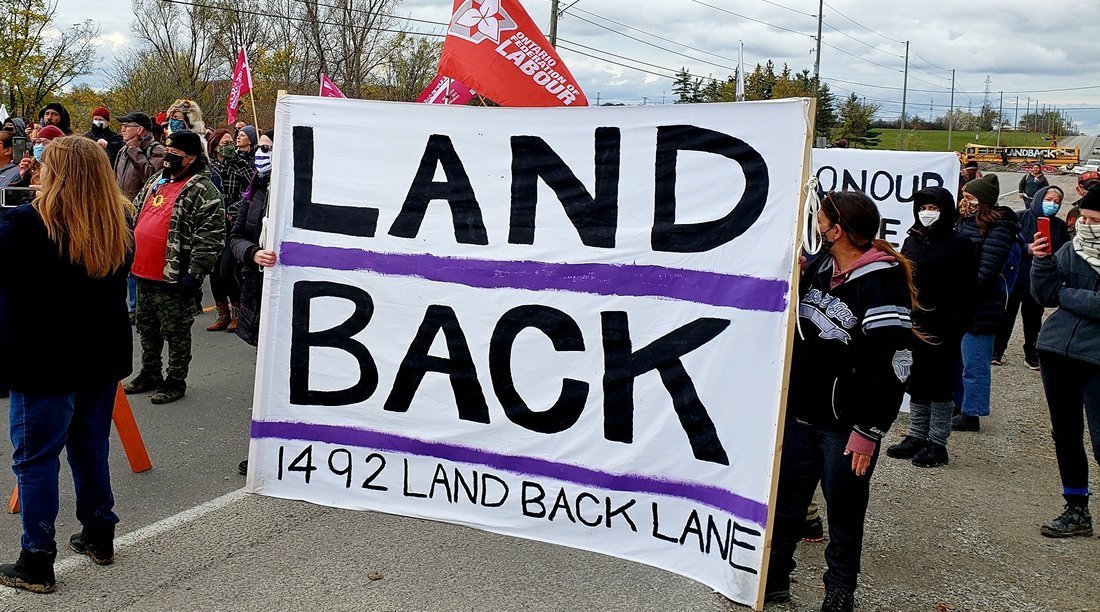
On December 13, Ontario Superior Court Justice Paul Sweeny granted a permanent injunction to Foxgate Developments, barring Haudenosaunee land defenders from reclaiming their own land near the town of Caledonia. Foxgate Developments now has the full weight of colonial justice backed by the armed force of the Crown to proceed with building 218 homes that was set to begin in November 2022.
The Haudenosaunee land defenders have fiercely defended their sovereign authority over the tract of land that they call 1492 Land Back Lane since June 2020, defying arrests, armed attacks by police and ongoing threats. The Crown, they say, has no business allowing the development as "free, prior and informed consent" – a key principle of the UN Declaration on the Rights of Indigenous Peoples – had not been given by the Six Nations to the Crown to proceed with this development.
Furthermore, the land defenders said they were taking a stand to ensure that their territory remains available to future generations. Less than five per cent of the original 384,451 hectares of the land known as the Haldimand Tract, designated as Six Nations territory by the British in recognition of their alliance with the Crown during the American Revolutionary War, remains in Six Nations hands.
Justice Sweeny's judgement relies on the racist Indian Act which recognizes only Crown mandated elected band councils. He dismissed Skyler Williams, spokesperson for 1494 Land Back Lane, and two other unnamed defendants, as not having authority to speak on behalf of the Haudenosaunee or the Six Nations. Sweeny said permission to proceed with the project had been obtained by the company from the elected band council, and therefore, Foxgate had the legal title and legal permits to build on that land.[1]
Additionally, Judge Sweeny wrote that Skyler Williams did not invoke Section 35 of the Canadian Constitution pertaining to Indigenous rights to defend himself nor did the defendants contest the legality of the permits held by Foxgate. Justice Sweeny simply ignored the fact that the Haudenosaunee of the Six Nations are sovereign people with nation-to-nation relations between themselves and the Crown, historically affirmed in the Royal Proclamation of 1763 and codified in the Two-Row Wampum. The Superior Court decision once again imposed colonial justice over the sovereign rights of the Six Nations.
In his decision, Judge Sweeny cited the 2019 BC Supreme Court ruling that granted an injunction to Coastal GasLink (CGL) Pipeline against Wet'suwet'en land defenders resisting the building of the pipeline being forced through their territory without their consent. He wrote that in that decision, the judge also noted that CGL has the legal permits and could not be stopped, no matter what the "honestly held beliefs" of the Wet'suwet'en land defenders were. Judge Sweeny wrote that the Wet'suwet'en land defenders' "unlawful self-help" remedies were "contrary to the rule of law" and "an abuse of process."
With zealous colonial arrogance Sweeny lectured: "Under our system of law, property rights are sacrosanct. For that reason, the rules that generally apply to injunctions do not always apply in cases such as this. The balance of convenience and other matters may have to take second place to the sacrosanctity of property rights in matters of trespass."
1492 Land Back Lane responded to this illegal, unjust decision with a statement on their Facebook page. It reads: "The Crown is relying on their assertion of title from 1853, long after the Haldimand Proclamation, without consent of the Haudenosaunee, in a time when Indigenous People had no right to defend their interests in court. Canada's colonial legal system is fundamentally designed for this purpose: to deny our inherent connection to our lands, to dispossess us in order to extract resources and develop our territory without our consent. This is exactly how land theft is made legal.
"Our camp has spent every one of the last 878 days building our home at 1492 Land Back Lane. We will continue to cultivate orchards, sing our songs, and hold space here. We will be free on our land for however long it takes Canada to realize we are never going to leave and for generations after that." Skyler Williams, spokesperson for the Haudenosaunee land defenders also noted: "Our people will continue to live peacefully at 1492 Land Back Lane. Any disruption to peace here will be brought on by the courts, developers, and police, which we will absolutely defend ourselves from."
Note
1.The claim of Judge Sweeny that the project was approved by the Six Nations band council is without merit. First of all, the Indian Act band council was imposed by force by Canada in 1923 which outlawed the centuries-long traditional hereditary governance system of the Haudenosaunee. The aim of the band council system was to restrict the political power of Indigenous people and reduce their hereditary and historic claims, displace them from their lands and assimilate them into the Canadian body politic. The "deal" in which the band council agreed to publicly support the proposed McKenzie Meadows housing project by Foxgate Developments and "not interfere with it, help quell any protests, and support property development company" was signed in 2019. Foxgate Developments also gave the elected band council $200,000 for their "consent." The project did not have the support of the Haudenosaunee Confederacy Chiefs Council nor the majority of the Haudenosaunee. (Aboriginal Peoples Television News)
(With files from the CBC, 1492 Land Back Lane, Ontario Superior Court)
Finding Solutions for Problems Faced by Asylum Seekers
Montreal Community Organizations Demand
Dignity and Rights for Asylum Seekers
On January 24, a number of community organizations in Montreal held a press conference "to respond to the distress of asylum seekers and address the flaws of a deficient reception system."
Their joint press release informed that "despite the determination and efforts undertaken to address the challenges of a crisis that continues to deepen, community resources are lacking, with the teams nearing exhaustion. This new demand just adds to the list of other urgent needs of a vulnerable population exacerbated by the pandemic and its socio-economic repercussions."
Jean-Sébastien Patrice, Director General of the MultiCaf Cafeteria, a food community resource covering Montreal's Côte-des-Neiges area, said: "Our services have been stretched to the limit. We're at 400 per cent capacity, minus any significant funding to address emerging needs."
The coalition, which groups together coordination committees in 13 Montreal districts, is urging the governments of Quebec and of Canada to act quickly and cooperatively to address the urgent needs of asylum seekers and provide them access to all public services, so that they are treated with dignity and their rights are recognized.
"The ineligibility of asylum seekers to a good number of state programs and services places this particularly vulnerable population in an even more precarious situation," notes Stephan Reichhold, Director of the Table de concertation des organismes au service des personnes réfugiées et immigrantes (TCRI).
Amongst other things, the coalition is demanding increased funding so that community organizations in all sectors are able to fulfil their mission and strengthen their capacity to provide adequate assistance to asylum seekers. They are also calling for the annulment of the 1996 Council of Ministers' decision limiting access to public services for asylum seekers; that asylum seekers be eligible for Quebec's Ministry of Immigration, Francization and Integration's entire Program of Support and Assistance to Integration (PASI), as well as subsidized child care services and employability measures financed by Service Québec; improved legal support services; and the establishment of a transitory shelter for those without decent lodgings.
The coalition's press release points out that although migration is not a new phenomenon, "today, worldwide, we have the highest official number of displaced persons since the Second World War, a situation that conflicts and climate change risk worsening. Yet the spontaneous mobilization and collective actions, emerging in various districts, which for months now have assisted in containing a humanitarian crisis, demonstrate the determination of Quebec society to improve the conditions for receiving asylum seekers."
What is revealed by those working to hold the society together is that both the Quebec and federal governments continue to violate their international and social responsibilities towards those who, in desperation, have come knocking at our door.
We can only rely on our own mobilizing and organizing work
amongst the population to bring in immigration policies which
are truly humanitarian. The rudiments of such policies are
beginning to be seen in the demands put forward by those working
on the ground in defence of the most vulnerable. They are
voicing what it is they do not want, such as that human beings
not be treated as categories or things, to be disposed of at
whim, rather than as human beings, with all the rights that
entails.
(Quotations translated from original French by TML.)
Community Organizer Elaborates Problems
Facing Asylum Seekers
In a radio interview on January 24, Eva Gracia-Turgeon, the coordinator at Foyer du Monde (Home of the World), explained that the community is being increasingly called upon to respond to the needs of asylum seekers, particularly with regard to access to services. Foyer du Monde is part of the coalition of community organizations fighting in defence of asylum seekers. She added that housing is one of the most crying needs.
She explained that in Quebec, rather than having a system where all are under the responsibility of the Regional Program for the Settlement and Integration of Asylum Seekers (PRAIDA), at present PRAIDA is actually only taking care of one out of every four, or 25 per cent of asylum seekers. The others, she explained, are being kept in federally-managed hotels, where the only service provided is assistance to fill out refugee applications. Because they are not being provided any other services, they are seeking help in nearby neighbourhoods. The community organizations being called upon for assistance are not being provided with any additional government funding.
Those lucky enough to fall under the purview of PRAIDA are under their charge for two weeks, and no one knows what happens to them after that, Eva Gracia-Turgeon said.
Quebec and the federal government share responsibility for immigration because of the Canada-Québec Accord. Eva Gracia-Turgeon says there is a gray area concerning asylum seekers and all those with temporary status for that matter, including temporary workers, and persons without status are not part of the agreement.
"So Quebec wants money to manage the territory and in that regard, the federal government is in negotiations to look at how much to give. ... It's the families on the ground that are paying for the political impasse," she said.
Regarding the coalition's request that the Quebec Council of Ministers' 1996 decision limiting access to public services for asylum seekers, Eva Gracia-Turgeon clarified that "in fact, what we want is for asylum seekers to be treated like all immigrants.... Because of that decision, all the services financed by the Ministry of Immigration are not accessible to asylum seekers. Here, I'm referring to the services called the Integration and Accompaniment Assistance Program (PASI) that are accessible to all Quebec permanent residents."
She explained that the coalition is also asking for access to subsidized child care services. "We have people here who want nothing more than to work, who are having difficulty getting their work permit. However, that's another federally-regulated issue, with all the delays linked to it. But they're here and they just want to work and unfortunately, because there are no employment services available to them, they're mostly forced to deal with the agencies. And we're all aware of all the problems related to the agencies at present. We've heard a lot about them. It's not a place where as an employee or a worker, you're protected."
(Radio-Canada. Quotations translated from original French by TML.)
Tribute to Victim of Canada's "Rules-Based Order"
On December 23, 2022, Fritznel Richard froze to death after being caught in a winter storm on the Roxham Road on his way to the United States. He had passed through the forest leading to the road in an attempt to reach his wife and 19-month-old son who had already left Canada for the United States.
Originally from Haiti, Fritznel Richard was a beloved spouse, family man and friend to those around him. He fled Haiti where his life was in danger and became a refugee claimant in Canada in December 2021, accompanied by his wife Guenda and his then seven-month-old baby, after a difficult journey through the Americas. He and his wife were looking for a new land, a home.
Unfortunately, policies towards refugees caused Fritznel to choose to leave Canada, hoping to join his wife and child who had left before him in October. Where he had come to seek a new life, he lost his life. He also leaves behind an 11-year-old son who is still in Haiti and needs medical attention.
|
On Sunday, January 15, a vigil in memory of Fritznel Richard was held, in a symbolic way, in front of the offices of the Canadian Immigration Section at the Guy Favreau Complex in Montreal, to salute this courageous young man.
People gathered at a funeral home in memory of Fritznel Richard on January 22. Guenda, his wife and her sister participated in the event via videoconference. The room was filled with people from Montreal's Haitian community as well as many supporters and friends. The event was deeply moving.
Frantz André spoke on behalf of the Action Committee of Non-Status People. Who is Fritznel Richard, he asked? "It is each of you [...] in search of a new life [...] who have hope of finding ... a better life [...] who today are questioning foreign policies, immigration policies that I believe are dangerously criminal policies, as we saw with Fritznel's case."
"We need to talk about what politicians are saying that make us reject people who have come here to contribute, contrary to the political rhetoric during elections, that 'these are people who come here, 80 per cent stay in Montreal, they don't speak French, they don't embrace Quebec values.
"During the pandemic, who best embraced Quebec values? It was these people, guardian angels as Mr. Legault called them, who saved lives. What greater message to embrace Quebec values than to save the lives of Quebeckers?" Frantz André added.
He pointed the finger at the migration policies of governments. "Those who have arrived like Fritznel and Guenda, with a seven-month-old child, [...] have passed through forests, countries where they almost died and where they saw people die in front of them... They arrive here in a country that calls itself a host country, a country where democracy reigns, where it is a country of rights and laws. And to die here? In 2023? Is that the order of welcome? I'm not talking about Quebeckers and Canadians, I'm talking about our politicians, I'm talking about the migration policies that make people get rejected."
A fundraiser has been organized to support the family during this trying time and to help Fritznel's wife pay medical expenses for herself and her children. For the link click here.
Spirited Hamilton Rally Demands
Status for All Without Exception
Hundreds of people rallied at lunch hour outside the Hamilton Convention Centre January 23 demanding that the Trudeau government make good on its promise and implement a regularization program open to all those living in Canada without permanent status. Migrant workers from Hamilton and Toronto were joined by members of the United Steelworkers Local 1005, and other working people, including a contingent from the Marxist-Leninist Party of Canada.
The rally was held outside the Trudeau cabinet's winter retreat where they were to decide whether to proceed immediately with a regularization program. If all the Ministers didn't support doing so then they were to schedule further meetings, meaning further delays.
Migrant workers pointed out that the cabinet is taking decisions that affect their lives, the lives of all Canadians and demanded that their just stand for Status for All! must be implemented now. Delays mean continued deportations and deaths.
Those addressing the rally spoke with pride of the work they do and have done throughout the pandemic, in building and maintaining Canadian society whether as workers in health care, agriculture, construction or in many other sectors of the economy. They are claiming from this society what is their due -- the right to stay and make their lives here and the conditions they require to make their contribution, from health care and social services, to pursuing their education to being able to re-unite their families. Several of the speakers were workers who, having worked here throughout the pandemic, have now become undocumented and are facing imminent deportation.
Expressing their determination to see the fight for status for all through to success rally participants called on all Canadian workers to join them in defending the rights of all.

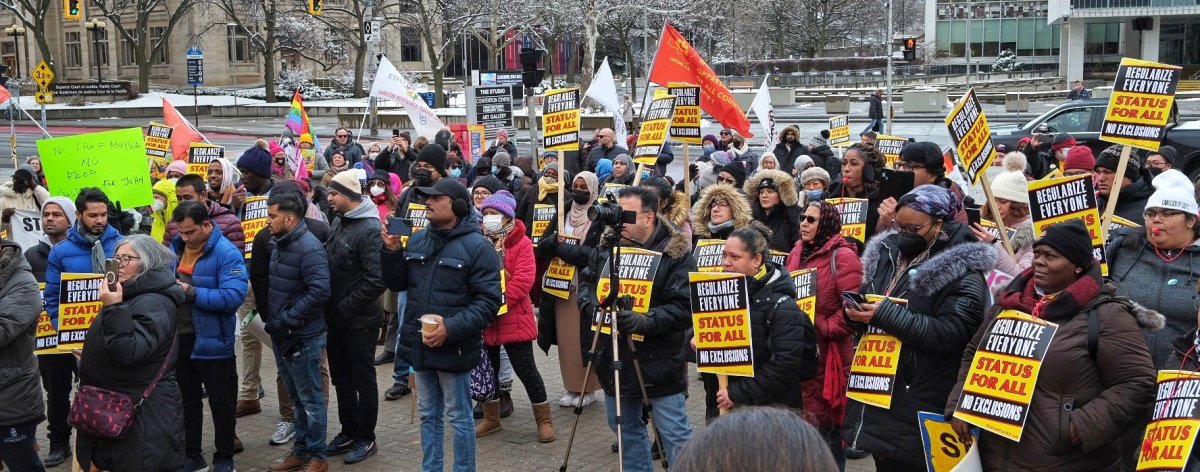

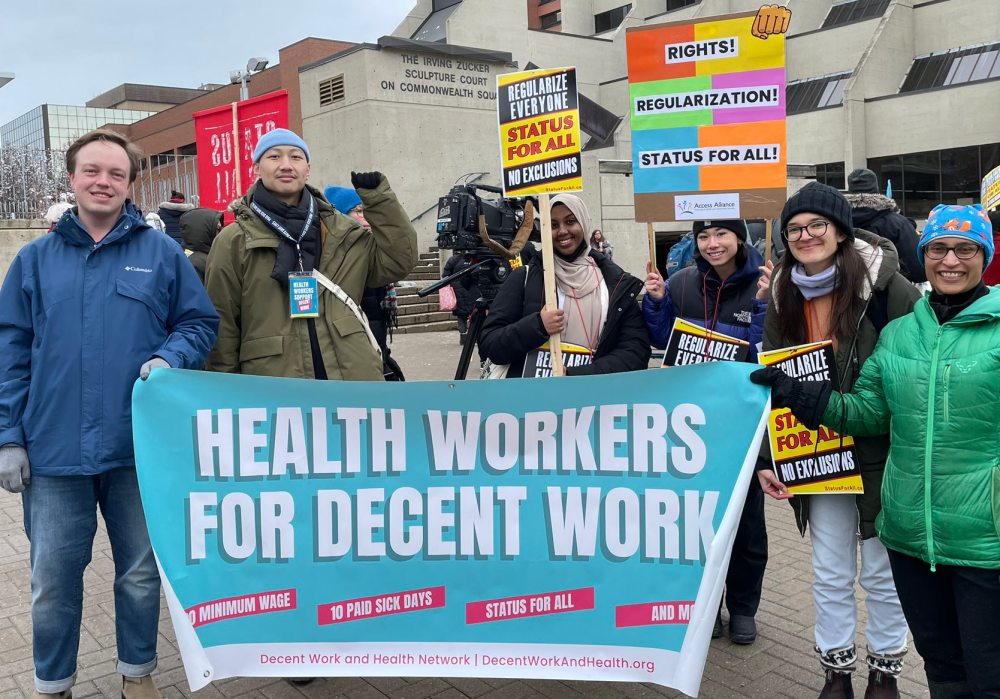
Matters of Concern Around the World
No to Canada's Interference in Peru!
Support the Peruvian People's Just
Demands!
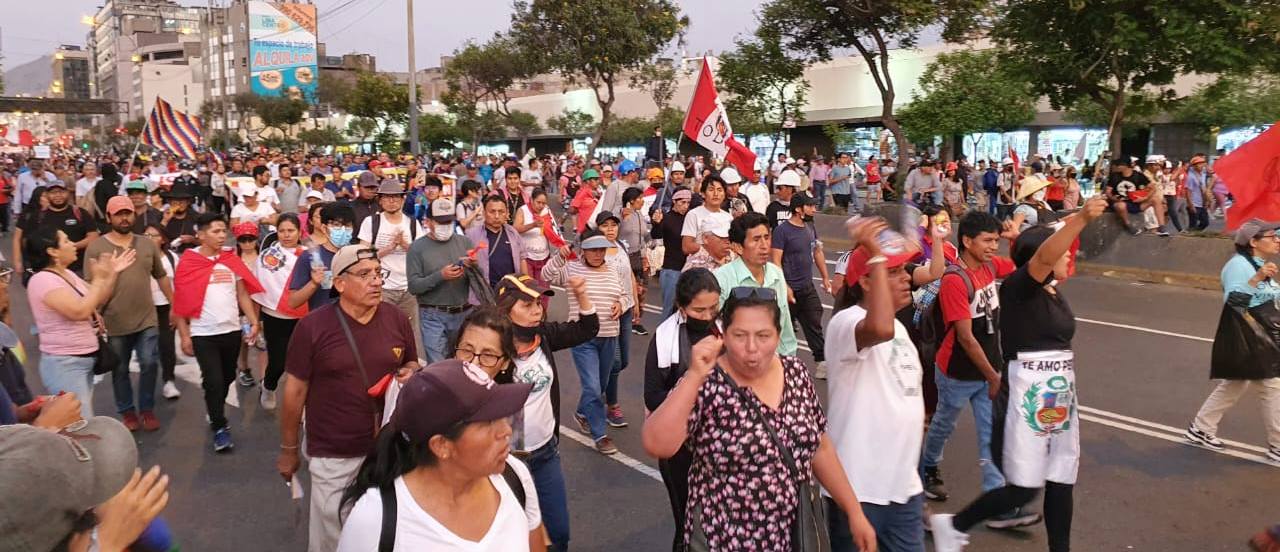
Protest in Lima, Peru, February 9, 2023.
The Communist Party of Canada (Marxist-Leninist) condemns the support given by the Government of Canada to the coup regime in Peru which removed elected president Pedro Castillo and imposed Dina Boluarte as the new president and, by extension, its support for the crimes that regime and its so-called security forces have been committing against the people.
CPC(M-L) salutes the Peruvian people who have risen in protest against the coup, waging heroic protests that have continued non-stop and grown despite brutal repression which, in less than two months, has caused over 60 deaths and many injuries. The people categorically reject Castillo's dismissal, and are calling to shut down Congress, for fresh legislative elections to be held without delay, and that steps be taken towards the drafting of a new constitution to replace the current neo-liberal one, written and imposed in 1993 during the criminal Fujimori dictatorship.
At least 14 countries in Latin American and the Caribbean including members of the Bolivarian Alliance for the Peoples of Our America (ALBA) have publicly expressed support for President Castillo and for the popular will of the Peruvian people. They have condemned the Peruvian police and military's killings and repression of protesters and expressed support for the Peruvian people's defence of a democratically-elected government.
In all of this, Canada was quick to recognize Dina Boluarte as the new president of Peru, and sent its ambassador in Lima to convey in person a message of support to the new government. It is an unacceptable use of its prerogative powers in foreign policy to accept, in the name of the people of Canada, what is taking place in Peru.
The government of Canada clearly has no interest in learning the lessons of its dastardly participation in the 2004 U.S.-French coup against Haiti and its aftermath and its support for the coup against Evo Morales and for regime change in Honduras. Canada's formation of the disruptive Lima Group to overthrow the government of Nicolás Maduro in Venezuela and support onerous, illegal sanctions which have caused untold harm to millions of men, women and children in that country are another case of its reactionary foreign policy in Latin America and the Caribbean. The so-called Lima Group, formed at the behest of the U.S. and comprised of a handful of countries under the jackboot of the U.S., utterly failed time and time again to mobilize the Latin American and the Caribbean region against itself in spite of using all kinds of self-serving methods covered with talk about defending democracy, human rights and a rules-based international order.
Despite the backing of the U.S. state power and reactionary media in the U.S. and other countries in its orbit, including Canada, all the attempts of these forces of the Old to foment counter-revolutionary changes through the Organization of American States (OAS), their attempt to arouse support for outright reaction amongst immigrant populations abroad, such as in favour of the Bolsonaro regime in Brazil or the Bukele dictatorship in El Salvador, have failed time and time again to turn the tide of history in their favour.
Canada is currently expressing support for President Lula and the decisive action he took against the recent assault on the Brazilian parliament and other state institutions. At the same time, it is supporting the criminal who has usurped the presidency in Peru and the crimes of the reactionary forces currently backing her. This shows that Canada is up to no good internationally and that it is on the wrong side of history, which belongs to the peoples, not those who usurp power by force and use it against the peoples. Canada is showing over and over that it will do anything under the command of the United States and its NATO military alliance.
Hands Off Peru!

For Your Information
The deposed president of Peru, Pedro Castillo, is a former elementary school teacher, farmer and union leader. He was deposed on December 7, 2022, after being elected in a runoff election on June 6, 2021, defeating the daughter and continuer of the legacy of corrupt, foreign-backed former dictator Alberto Fujimori. Fujimori senior is currently serving a 25-year prison sentence for crimes against humanity, including murder and kidnapping, as well as the many corrupt acts he committed when he was president from 1990 to 2000. His daughter has herself been in and out of detention since 2018 also on charges of corruption. Pedro Castillo's confirmation as president was delayed some six weeks after he was elected thanks to a succession of legal challenges she filed to try and get the results invalidated based on bogus allegations that her opponent had won based on "fraud." Unable to pull off the electoral coup they were aiming for, the Fujimorists shifted to using their majority in Peru's unicameral Congress to remove Castillo through a parliamentary coup instead once he was installed.
From his first day in office the reactionary forces engaged in repeated acts of sabotage and destabilization against Castillo and his government using the tactics dubbed lawfare – a form of warfare that uses the courts and state institutions to misuse the law to achieve anti-social, anti-national and outright criminal aims. The same tactics were used by foreign-backed reactionary forces in Brazil to illegitimately remove former President Dilma Rousseff from office and to criminalize President Lula to prevent him from running for election in 2018. Other leaders such as the former presidents Evo Morales of Bolivia and Rafael Correa of Ecuador and Vice President Cristina Kirchner of Argentina are among those who have been subjected to similar kinds of legal persecution.
In the case of Pedro Castillo no less than six criminal investigations have been opened against him on the basis of an ongoing smear campaign waged by the oligarchic media in Peru and abroad. In the legislature reactionary and racist opposition forces attempted twice, first four months into his term, then again four months later, to impeach him, based on a provision in Peru's Constitution for the Congress to declare a "vacancy" in the presidency on the grounds of the "permanent moral incapacity" of the president. After failing both times to get the required number of votes to depose him, a third attempt was scheduled for December 7. This time President Castillo pre-empted it by invoking Article 134 of the Constitution which establishes that following the legislature's denial of two confidence votes called for by the Executive, the president is empowered to dissolve Congress and call a new election. He declared in a video address to the nation that in order to re-establish the rule of law and democracy and put an end to the "Congressional dictatorship" that had deliberately and maliciously blocked his ability to get any laws passed, he was temporarily dissolving the legislature in order to hold an election for a new Congress, which he said would have constituent powers to draft a new Constitution within nine months.
In response, a majority of legislators pounced and voted to immediately depose him, bypassing a number of steps, including Castillo's right to defence, and without obtaining the number of votes required by the Constitution for what they did. They then appointed Castillo's vice president, Dina Boluarte, as the new president, a role she happily assumed, showing she was also part of the coup forces. The heads of the Peruvian Armed Forces and National Police also intervened in the political process, issuing a statement against Castillo's actions and arresting him. Federal prosecutors followed up by indicting him on trumped up charges of "rebellion" for allegedly "breaching the constitutional order." A judge then ordered Castillo to serve 18 months of preventive pre-trial detention, which the Supreme Court has upheld, in spite of all the irregularities involved.
Supporters of President Castillo immediately responded by denouncing the coup d'état the reactionary forces were finally able to consummate against him and are demanding his release and the resignation of the usurper Dina Boluarte. The response of the coup regime has been to ignore their concerns and to brutally repress them. There were reports in December of police raiding the offices of social movements, political parties, labour unions and organizations such as the Campesino Confederation of Peru and of the coup regime planting weapons and other materials there in order to falsely accuse protesters and leaders of social organizations of "terrorism." The coup government has also brought back criminals who committed crimes against the Peruvian people under the Fujimori dictatorship.
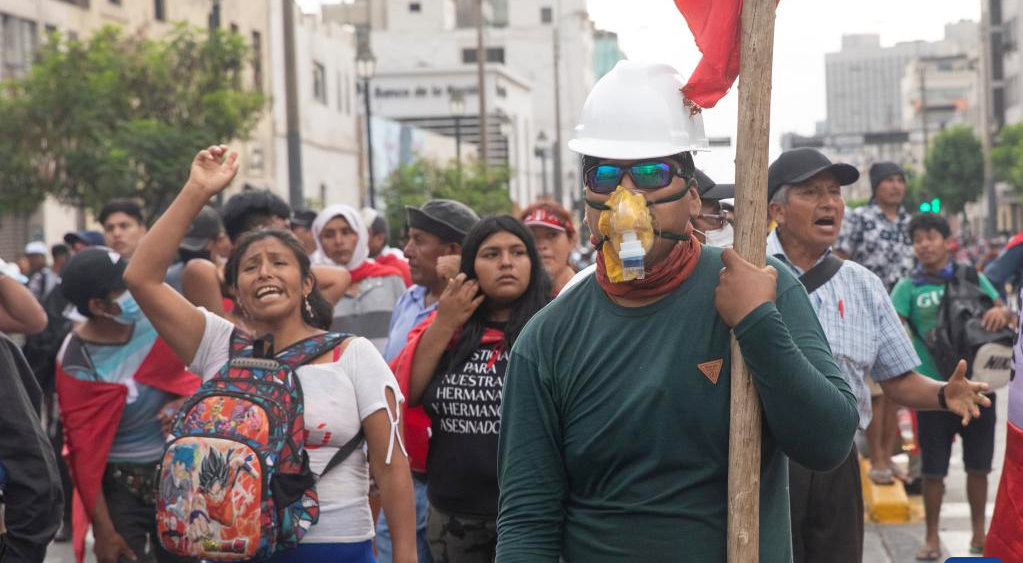
(Photos: manoalzadilma, Red Muqui, Xinhua)
Shame on Canada for Deploying Spy Planes to Haiti

Demonstration against U.S.-Canadian interference in Haiti,
Montreal, October 28, 2022.
While the airwaves are filled with praise for NORAD shooting down foreign objects flying over the Canadian north and speculations about which country is "spying" on Canada and the United States, on February 7, Defence Minister Anita Anand and Foreign Affairs Minister Mélanie Joly announced that Canada has deployed a CP-140 Aurora aircraft to help "disrupt the activities of gangs" in Haiti.
Military spokesman Capt. Graeme Scott said that "the long-range surveillance plane was originally assigned to a U.S.-led counter-narcotics mission in the Caribbean before being tasked with conducting two flights over Haiti over two days," according to the news report.
"The CP-140 has been capturing information that will be used by the government of Canada to further assess the situation in Haiti," Scott said in an emailed statement. "As the aircraft has now completed that information gathering, as part of Canada's response to the situation in Haiti, it is now on its way back to Canada," he said.
As if Canada does not already know what is happening in Haiti, when the entire world knows what is happening in Haiti and its representatives in Haiti and the entire Haitian diaspora tell it what is happening Haiti. Its mantra that "gangs" are the problem when it does not say who trained and finances those gangs is disingenuous to justify foreign intervention into Haiti and continued criminalization of the protests of the Haitian people and their demand to conduct their own affairs themselves, without foreign interference.
Canada is highly culpable for the devastation of Haiti, along with the U.S. and France, since together this triumvirate overthrew the Aristide presidency and is responsible for the conditions that were imposed afterwards, which made matters go from bad to worse. Haiti is the poster child by negative example for the rotten role Canada is playing internationally as it "hups to" in response to the demands of the U.S. to oppose the peace, democracy and freedom the peoples of Latin America and the Caribbean, as well as the rest of the world, are striving for. This latest move to send a spy plane over Haiti not only covers up the continuous spying the demonic triumvirate carries out in Haiti and over Haiti but is designed to prepare Canadians for some sort of a foreign military intervention. It must not pass!
Unions Join Forces to Support Haitian-Led Solutions to Crisis in Haiti
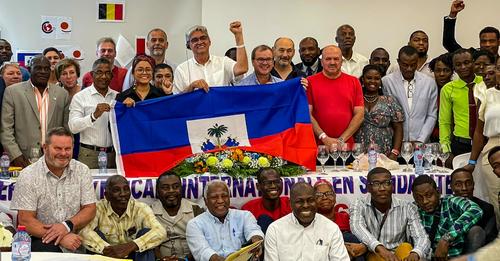
Participants in solidarity meeting held in January 2023
with the Confederation des Travailleurs Haïtiens.
On February 8, the Canadian Union of Public Employees (CUPE) issued a communique informing that a "solidarity gathering with Haitian unions has reinforced the need to respect the right of the Haitian people to decide their own future, and to support their efforts to end the crisis that has gripped the country."
That is good news.
CUPE took part in the meeting with the Confederation des Travailleurs Haïtiens (CTH) and their partner union the Confederation of Public and Private Sector Workers (CTSP), along with unions from 10 other countries.
CUPE explains: "International attention is focused on the current economic, political and social instability in Haiti. The crisis includes a rise in gang violence and power, the resurgence of cholera, a lack of access to health and social services, low wages, food insecurity, and the spiralling cost of scarce goods.
"What's drawing far less media and international attention is how the Haitian people are organizing for solutions that are led by them, including community and faith-based organizations and unions. The solidarity gathering aimed to raise awareness about the importance of this organizing, and to rally support."
The solidarity meeting ended with a joint statement, the Haití: Declaración de Ouanaminthe. It states that "the crisis in Haiti is due to bad governance, international interference, the absence of the rule of law and social justice, and a model of society where the economy is for the benefit of the elite."
It further adds that "any solution to the crisis in Haiti must begin with the recognition of the sovereignty of the country, the State and the people of Haiti. It is up to the people of Haiti to choose their leaders and their form of government. In the current context, any international armed intervention would go against the right to self-determination of Haitians."
CUPE reports that participants in the meeting are also developing a union strategy to rebuild from the crisis and boost international support and will release that roadmap in the coming months.
CUPE was represented by CUPE Regional Vice-President, Quebec, Richard Delisle. The meeting took place at the border with the Dominican Republic, in the commune, or community, of Ouanaminthe. The meeting was organized by the CTH and CTSP, which are Haitian affiliates of the International Trade Union Confederation and the Trade Union Confederation of the Americas.
CUPE has written to Canada's Minister for Foreign Affairs calling on the Canadian government to respect Haitian democracy and self determination, and to stay away from military intervention. "Our union continues to stand in solidarity with workers and community members in Haiti as they plan for a future that meets the needs and aspirations of all Haitian people,'" CUPE says.
(Photo: CUPE)
Earthquake Death Toll in Turkey and
Syria Exceeds 33,000
The death toll from the 7.8 magnitude earthquake on February 6 and subsequent aftershocks continues to rise, with more than 33,000 dead in Turkey and neighboring Syria as of February 12.
Speaking to Sky News, UN emergency relief coordinator Martin Griffiths expressed fears that the final death toll from the earthquakes in Syria and Turkey would exceed 50,000.
"It's difficult to calculate precisely because we have to keep searching through the rubble, but I'm sure the figure is going to at least double," Griffiths explained in Adana, Turkey, where he described the extent of the devastation as "terrifying."
The head of the World Health Organization, Dr. Tedros Adhanom Ghebreyesus, arrived in Aleppo on February 11 to tour hospitals and shelters with Syria's health minister and the governor of Aleppo Governorate. Ghebreyesus said he was accompanying "emergency medical supplies of about 37 metric tons."
According to the UN, the catastrophe may have left 5.3 million people homeless in Syria, and 200,000 in Aleppo alone.
More people have died due to the earthquake than were killed in the 2011 earthquake that shook Japan, sparked a tsunami, killed some 20,000 people, and started the Fukushima nuclear calamity.
Cuban officials on February 10 announced the departure of 32 medical professionals for Turkey, and Syria's Ambassador to Cuba, Ghassan Obeid, announced earlier in the week that 27 Cuban medical personnel would be traveling to Syria.
Canada's International Development Minister Harjit Sajjan on February 6 said the federal government will provide an initial $10 million in aid to Turkey and Syria. It has also made a separate commitment to match up to $10 million in donations to the Canadian Red Cross.
Sajjan said the government is also looking at deploying medical and search and rescue teams, but that first "we have to conduct the assessments. All that information needs to be worked out." Regarding the type of assistance Canada will provide, he said, "Nothing's off the table. We'll look at any options." Sajjan did not give an estimate of how long assessments will take.
Sajjan said that Canadian aid in Syria will be provided through the Syrian Arab Red Crescent, the International Red Cross organization in the country. He said that Canada's previously announced $50 million in aid to Syria could also be used to support earthquake relief efforts. This refers to aid announced in March 2021 at an international donors' conference to provide aid to Syria.

Palestinian urgent response teams leaves for Syria and Turkey
February 9, 2023, to assist in
earthquake zone.
(Agencies. Photo: WAFA)
Palestinian Political Prisoners Launch
Mass Hunger Strike
There are reportedly more than 7,000 Palestinians held in Israeli jails. Hundreds of them have been incarcerated under the practice of administrative detention. On February 10, they started a hunger strike in all Israeli prisons in protest against the death of a Palestinian prisoner due to deliberate medical negligence in a hospital in the Occupied Territories.
The move prompted the Emergency Committee of the Palestine Prisoners' Movement to announce a state of alert in all prisons of the Zionist regime on February 10 and three days of public mourning following the martyrdom of Ahmad Abu Ali.
The Palestinian Prisoners' Society (PPS) announced in a statement that Ahmed Badr Abdullah Abu Ali, a resident of Yatta in the south of the occupied West Bank city of al-Khalil, died at Soroka Medical Center on the morning of Friday, February 10.
The 48-year-old Abu Ali was detained in 2012 and sentenced to 12 years in prison. His family says he was suffering from chronic heart failure, diabetes and obesity and was admitted to the hospital after his health condition sharply deteriorated.
The PPS held Israeli authorities fully responsible for Abu Ali's death and for the fate of all ill Palestinian prisoners being incarcerated at the regime's detention centers, stating that his death represents yet another crime that the occupying Tel Aviv regime is systematically perpetrating against Palestinians.
Human rights organizations say Israel violates all the rights and freedoms granted to prisoners by the Fourth Geneva Convention. They say administrative detention violates their right to due process since the evidence is withheld from prisoners while they are held for lengthy periods without being charged, tried, or convicted.
Palestinian detainees have continuously resorted to open-ended hunger strikes to protest their detention and the conditions in the prisons of the Zionist regime. Israeli jail authorities keep Palestinian prisoners under deplorable conditions without proper hygiene standards. Palestinian inmates have also been subject to systematic torture, harassment, and repression.
U.S. War Against Africa Intensifies
The U.S. military's Africa Command (AFRICOM) reported attacking and killing dozens of Africans in Somalia during three separate raids in late January. The U.S. military conducted two strikes near the Galcad area of northeast Mogadishu, the capital of Somalia, and another two days later in northern Somalia. Reports say the first and second raids occurred January 20 and 23 killing 32 Africans some of whom were from South Africa according to AFRICOM.
U.S. media reported the military raids and "successful" killings in a triumphalist manner with lurid accounts of the deaths and the "heroism," "meticulous planning" and "advanced weaponry" of the U.S. attackers. U.S. Defense Secretary Lloyd Austin explained the undeclared war in Africa is necessary to keep "the United States and its partners safer and more secure."
AFRICOM seeks to force the African people to submit and it does so with utmost cruelty in the name of defending human rights, peace and democracy while Canada remains silent.
Their silence cannot hide the fact that AFRICOM has unleashed a wave of terror and deadly assaults across wide swaths of Africa using attack drones and other modern weapons in attempts to overwhelm its rivals and secure its control over the region. Canada's appeasement of the U.S. includes using its own means to protect what it calls Canadian mining interests. For its part , the African continent continues its striving to free itself from centuries-old colonial rule and control and the impoverishment, crime, corruption and desolation ts brings with it.
The peoples of Africa are the greatest fighters for freedom and their right to be. They have their own thought material and history of global exchanges, enlightenment and contributions. They have shown many times over that where there is oppression, there is resistance. The peoples of Africa are determined to build the new Africa free and independent of the colonial powers that have oppressed and enslaved them, stolen their resources, left them in poverty for centuries on end and committed crimes of untold proportions. They will definitely settle scores with those who seek to enslave them all over again and are doing so already.
(To access articles individually click on the black headline.)
Website: www.cpcml.ca Email: editor@cpcml.ca



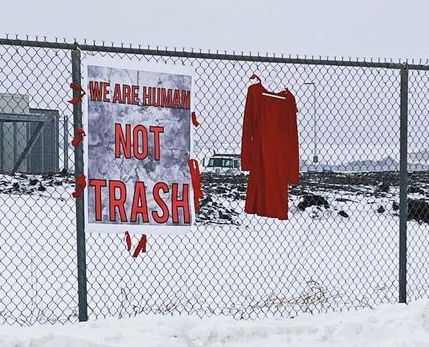 Sign outside
Brady Road landfill in Winnipeg where remains of
murdered Indigenous women were found.
Sign outside
Brady Road landfill in Winnipeg where remains of
murdered Indigenous women were found. 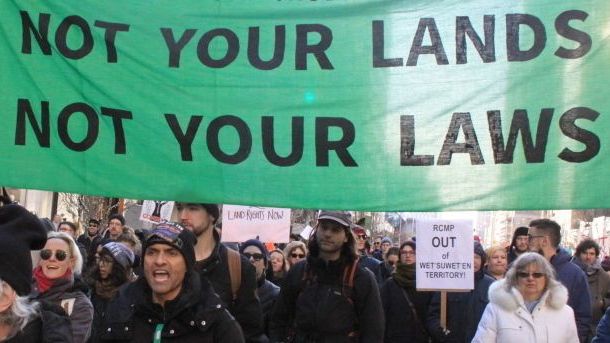
 Vigil on January 15,
2023, in front of the offices of the Canadian
Immigration Section at the Guy Favreau Complex in
Montreal
Vigil on January 15,
2023, in front of the offices of the Canadian
Immigration Section at the Guy Favreau Complex in
Montreal 